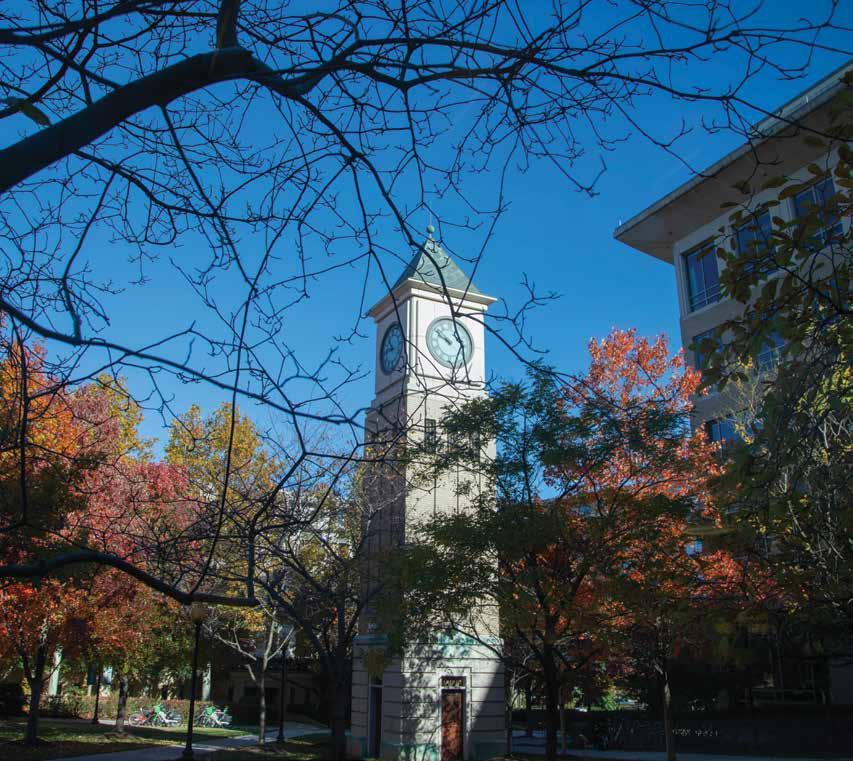




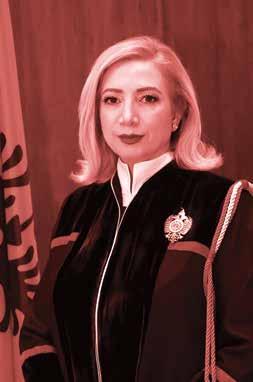
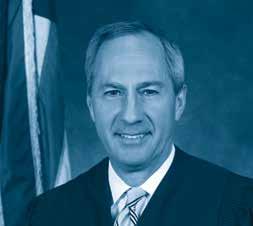
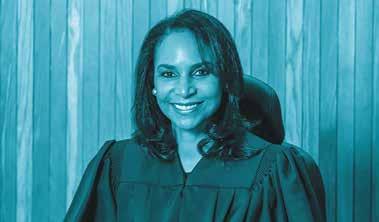
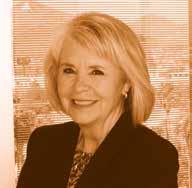
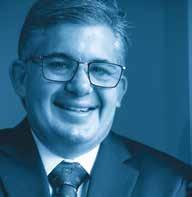
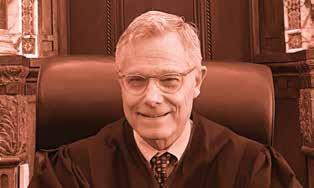
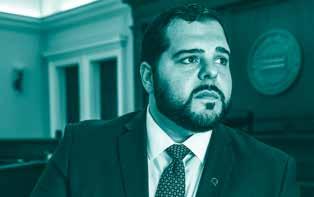
Fall 2024
ELIZABETH TERRY Editor
BRENT FUTRELL
Director of Design
INES HILDE
Associate Director of Design
CONTRIBUTORS
Sarah Adler, Rebecca Beyer, Jaclyn Diaz, Merrie Leininger, Madeline Williams
Rebecca Beyer, a freelancer based in Boston, has written for the publications of many universities and law schools, including Yale Law School, Stanford Law School and Boston University School of Law.
PHOTOGRAPHY
iStock, Elman Studio, Michelle Frankfurter, Brent Futrell, Getty Images, Ines Hilde, Sam Hollenshead, Melissa Ryan, Wikimedia.
MATTHEW F. CALISE
Assistant Vice President of Alumni Engagement
GENE FINN
Assistant Dean of Development and Alumni Affairs
JUNE SHIH
Associate Vice President for Strategic Communications
WILLIAM M. TREANOR
Dean and Executive Vice President Paul Regis Dean Leadership Chair
Cover: Some of the Georgetown Law alumni judges interviewed for our feature story. Clockwise from top left: The Hon. Jonathan J.C. Grey, L’07, The Hon. Nina F. Elgo, L’90, The Hon. Thomas M. Hardiman, L’90, The Hon. Anita Josey-Herring, L’87, The Hon. Terrence G. Berg, F’81, L’86, The Hon. John P. Howard III, L’10, The Hon. Seth R. Aframe, L’99, The Hon. Holta Zaçaj, L’08, The Hon. Jennifer Zipps, L’90.
Back cover photo: Brent Futrell
Contact:
Magazine Editor Georgetown Law 600 New Jersey Avenue, N.W. Washington, D.C. 20001 editor@law.georgetown.edu
Address changes/additions/deletions: 202-687-1994 or e-mail addup@georgetown.edu
Georgetown Law magazine is on the Law Center’s website at www.law.georgetown.edu
Copyright © 2024, Georgetown University Law Center. All rights reserved.
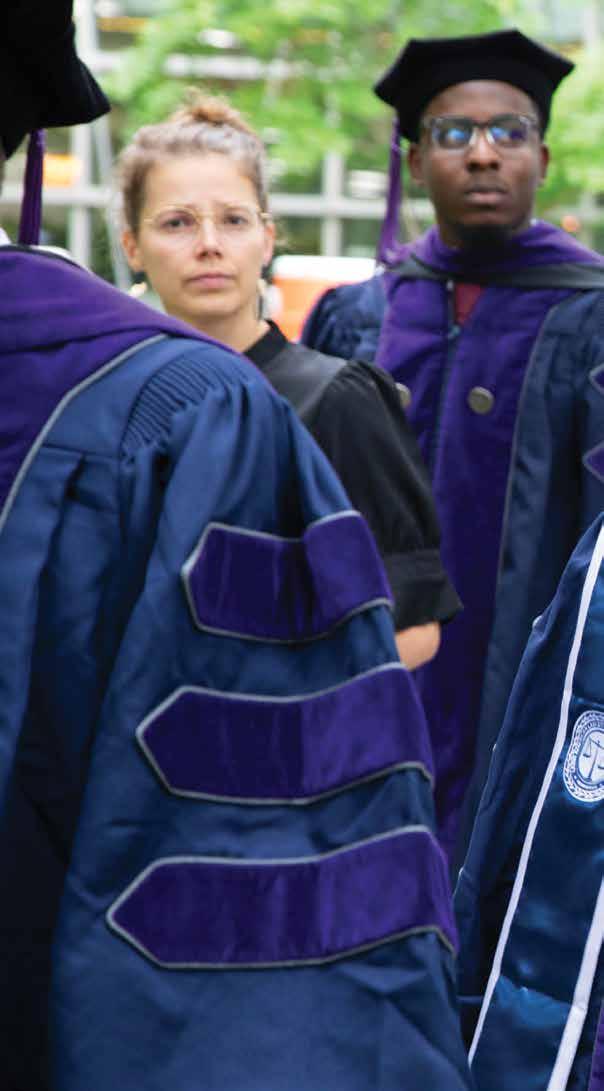
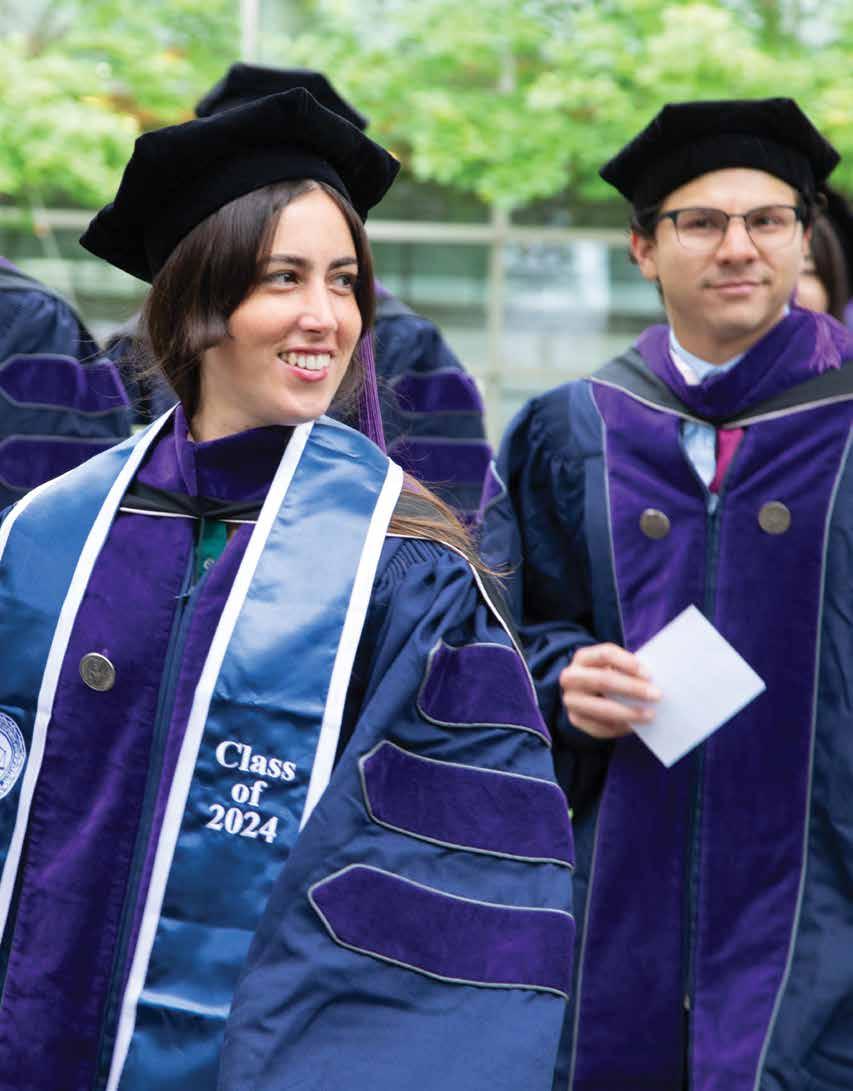
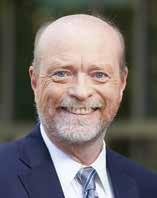
Our Georgetown Law community is full of extraordinary and inspiring people. I have been on the road quite a lot this year (see our fundraising update on the facing page), and I am always impressed with the alumni I meet. Lawyers who’ve had tremendous success in their practices and at their firms and businesses, dedicated public servants, advocates for all manner of causes, educators preparing the next generation of legal professionals, and many more.
And yet, there is always something intriguing about a judge. We in the legal profession look to our classmates and friends on the bench with admiration and pride. I also find myself curious about the judges I know as well. How did they get to where they are? What do they really think about the work they do?
In this issue’s cover story, a dozen of your fellow alumni who are judges and justices, here in D.C., across the country, and around the world, answer just those questions. I hope you enjoy this peek into their lives and careers.
Elsewhere in the issue are highlights from several exciting campus events, including the 25th anniversary celebration for our Supreme Court Institute, where we hosted three Supreme Court Justices – another opportunity to reflect on the role of jurists.
We also said goodbye recently to a beloved teacher and scholar, Professor Sherman Cohn, F’54, L’57, L’60, who passed away in August at the age of 92. His obituary is on page 46, but I hope you take the time to visit the news archive at the Georgetown Law website and read the many notes left by students and colleagues on his in memoriam page. They are a wonderful tribute to “Sherm,” a great alumnus and faculty member, but also an inspiring example of how kind words and sincere connections build our community.
With all best wishes,

William M. Treanor Dean and Executive Vice President Paul Regis Dean Leadership Chair

Georgetown Law has had an enthusiastic response from alumni and other supporters in our fundraising campaign to support a new flagship academic building on campus, which will be named Daniel Tsai Hall in honor of lead donor Daniel Tsai, L’79. We are now closing in on our overall goal.
Tsai, a Taiwanese businessman, is contributing $30 million to the building, which will house state-of-the-art classrooms, convening spaces with panoramic views of the U.S. Capitol and much more. Other alumni are giving generous individual gifts. A student moot court room will bear the name of David Belding, L’71, who has pledged $10 million. Duke Reyes, L’82, is giving $5 million to sponsor the North Event Room.
This campaign has also seen creative approaches to collective gift-giving. Alumni at several leading law firms have made joint gifts to name spaces in the building, as have a number of reunion classes. Donors from our large international alumni network will be recognized in a Global Lounge. Students and colleagues of the late Professor Sherman Cohn, F’54, L’57, L’60, are contributing to a fund to name a space honoring his legacy.

In the past year, Dean Treanor has visited multiple cities around the world, including New York, Boston, Los Angeles, Chicago, San Francisco, London, Frankfurt, Seoul, Taipei, Beijing, Tokyo and Paris, to connect with alumni communities and talk about the plans for Tsai Hall.
The building campaign will continue until June 30, 2025. To inquire about making a gift to name a signature space, please contact Gene Finn, Assistant Dean of Development, at ejf71@georgetown.edu
See the latest renderings of Tsai Hall and learn more about the campaign at www.law.georgetown.edu/new-building!
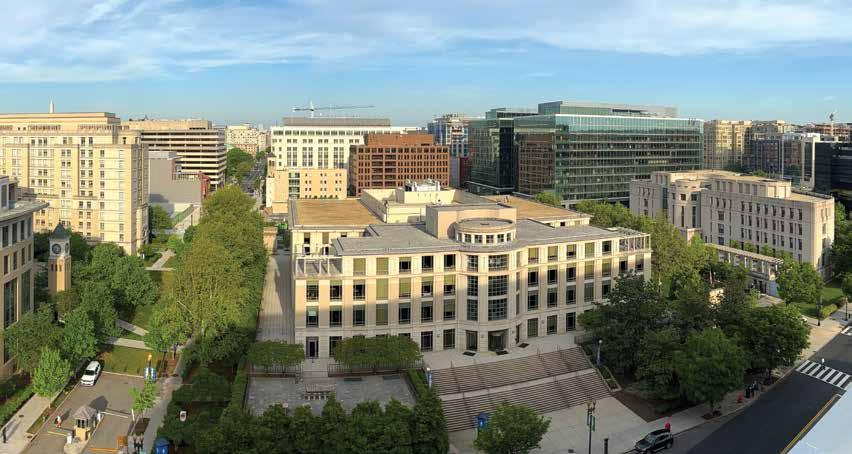
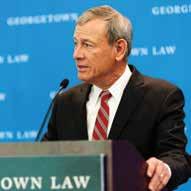
On April 24, three Supreme Court justices, eight current and former Solicitors General and numerous other legal luminaries joined Georgetown Law to mark the 25th anniversary of its Supreme Court Institute (SCI), which holds moots for nearly every case on the Court’s docket and invites students to watch.
“The Institute has brought together the very best of the Appellate Bar to prepare lawyers for appearances before our court. This has been a gift not only to the lawyers but also to the justices, for which we are grateful,” said Chief Justice of the United States John G. Roberts, Jr. in his remarks.
From the stage and in a retrospective video, others traced how a pie-inthe-sky idea evolved into an invaluable resource for lawyers preparing for oral argument – and a precious educational opportunity for students.
Longtime SCI Faculty Director Professor Steven Goldblatt, L’70, saluted all the past and current SCI staffers, professors and Supreme Court Bar members who’d played large and small roles in the Institute’s work over the years. “This is a celebration of all the people who have participated,” he said. “When you do the moot and you improve somebody’s argument, it’s a feel-good feeling.”
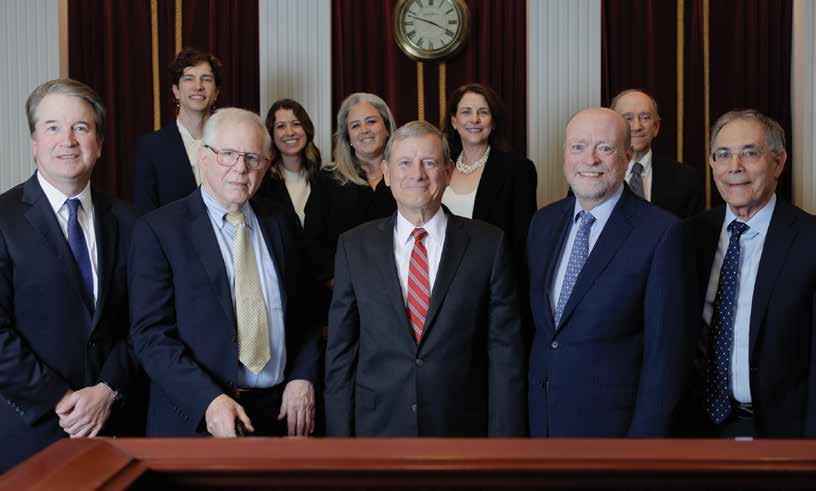
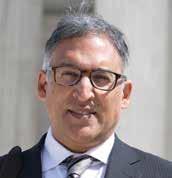
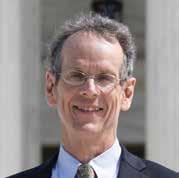
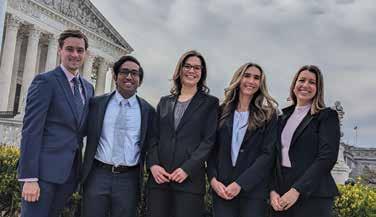
Georgetown Law professors are no strangers to the Supreme Court. But until March 18, it had never happened that both advocates in a case were members of our faculty.
In National Rifle Association v. Vullo, Professor David Cole, National Legal Director of the ACLU, represented the NRA, and Professor Neal Katyal, a partner at Hogan Lovells and former acting U.S. Solicitor General, argued for Maria Vullo, former superintendent of the New York State Department of Financial Services. The case concerned whether Vullo had violated the First Amendment in cautioning insurers about the “reputational risks” of working with the gun industry.
As expected, both delivered skilled arguments, but in the end, only one could win. On May 30, the Court issued a decision finding unanimously for the NRA, represented by Cole. Georgetown Law Magazine congratulates Professors Cole and Katyal and looks forward to seeing them back at the lectern in the future!
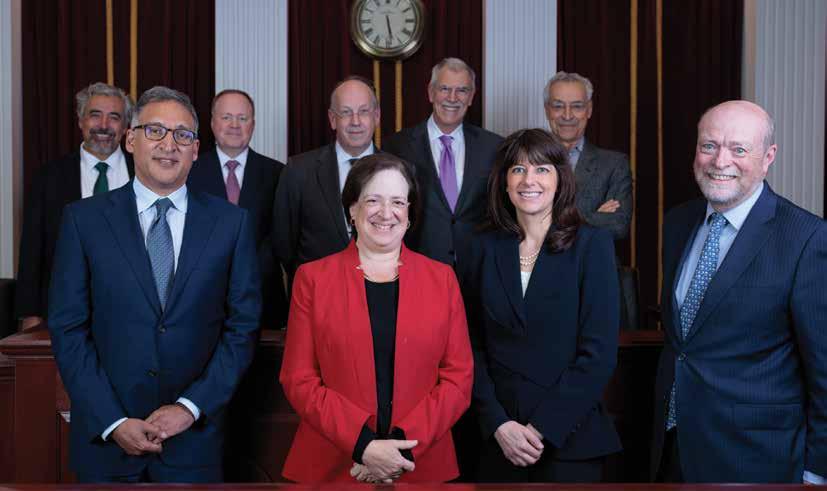
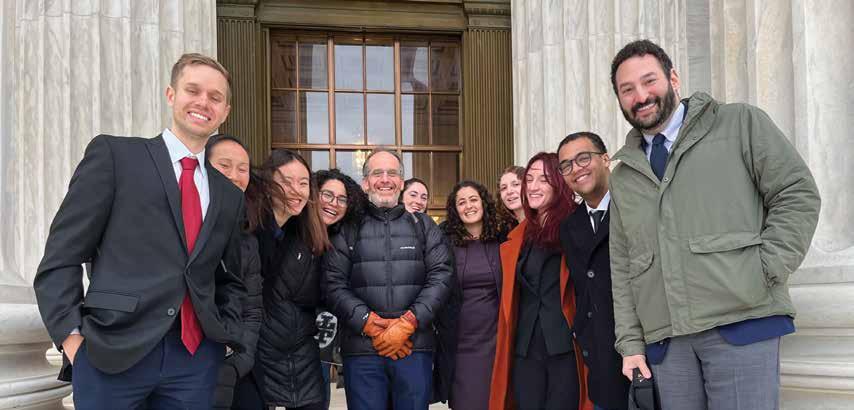
“The idea was not to just take a case, but change the law.”
- Professor Brian Wolfman, Appellate Immersion Clinic
Wolfman (center, in black jacket) and Meth (center, in purple dress) with clinic students at the U.S. Supreme Court.
In April, the Supreme Court issued a 9-0 decision for the plaintiff in Muldrow v. City of St. Louis, an employment discrimination case in which the plaintiff, St. Louis police officer Sgt. Jatonya Clayborn Muldrow, was represented by Professor Brian Wolfman, director of the Appellate Courts Immersion Clinic. The unanimous decision was the result not only of the briefs and arguments in that case, but of years of legal advocacy by Wolfman, his former deputy, Madeline Meth, L’17, and their students.
Wolfman and the team were looking for opportunities to challenge a three-decade-old legal doctrine requiring plaintiffs with job discrimination complaints under Title VII of the 1964 Civil Rights Act to prove that they had suffered an enhanced level of harm. “The doctrine just didn’t make any sense, because it was at odds with the statute’s text,” said Wolfman. “We decided not to accept it.”
They took on 13 different cases that, said Meth, “illustrated the scandalous state of the law.” Muldrow’s, in which she was moved out of the intelligence division, replaced by
a man and given inferior assignments and work schedule in her new position, was one. After her suit was rejected by the District Court and Eighth Circuit Court of Appeals for not demonstrating “significant” harm, Muldrow thought she’d reached the end of the road – until the clinic came calling two summers ago. “I did not realize that I had the option of taking my case to the Supreme Court,” she said.
“We saw this case as an opportunity for progressive textualism,” Wolfman said of his approach to his winning argument, as nothing in Title VII’s text requires proof of “significant” harm.
Muldrow, Wolfman and Meth didn’t meet in person until the day of the oral arguments last December. Muldrow walked back to campus with the clinic team and their students afterward, and joined them for lunch. “It was cool to meet so many people who were invested in doing the right thing,” she said. “If Maddie hadn’t reached out, we wouldn’t be here today.”
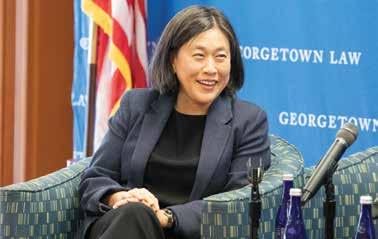
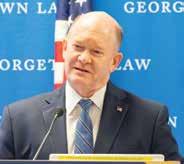
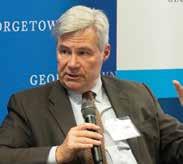
In February, the Center on Inclusive Trade and Development (CITD) hosted “Remaking Global Trade for a Sustainable Future,” a conference that took place on the eve of a World Trade Organization ministerial conference and focused on a reform framework prepared in advance of that event. United States Trade Representative Katherine Tai and U.S. Senators Chris Coons (D-Del.) and Sheldon Whitehouse (D-R.I.) were among the day’s speakers, along with legal experts, policymakers and business and nonprofit leaders.
“The world has changed, and... the global rulebook on trade needs to change along with it,” said Coons during his keynote remarks, advocating for trade policies that address the impacts of climate change and engage with the Global South.
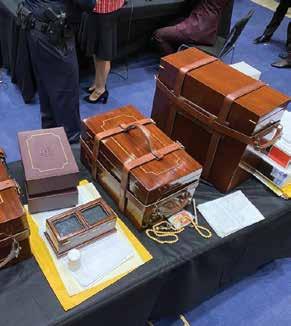
On March 4, the Institute for Constitutional Advocacy and Protection (ICAP) and partners Law Forward and Stafford Rosenbaum LLP announced a settlement in Penebaker et al v. Hitt et al, its litigation against participants in a fraudulent electors scheme to overturn the 2020 presidential election. Following a 2023 agreement with 10 fraudulent electors in Wisconsin, the latest settlement resolved the case against former President Donald Trump’s Wisconsin campaign attorney, James Troupis, and legal adviser Kenneth Chesebro. The settlement’s terms included no admission of wrongdoing or liability by the two men, their agreement to never take part in such activities in future presidential campaigns, a payment by Troupis to the plaintiffs and the public release of some 1,400 pages of related email and text messages and other materials.
“[This case] was about accountability,” said ICAP’s executive director, Visiting Professor Mary McCord, L’90, explaining that the communications records secured through the settlement not only shed new light on the Wisconsin scheme’s execution, but also on Troupis and Chesebro’s role in similar plans in other swing states and contacts with White House insiders between Election Day and January 6th, 2021.
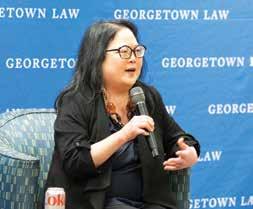
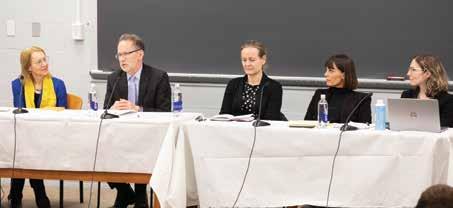
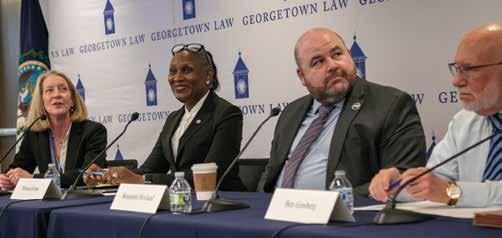
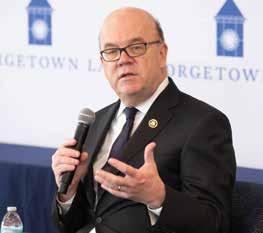
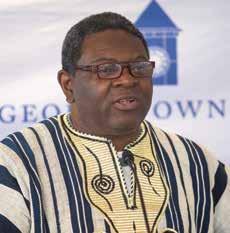
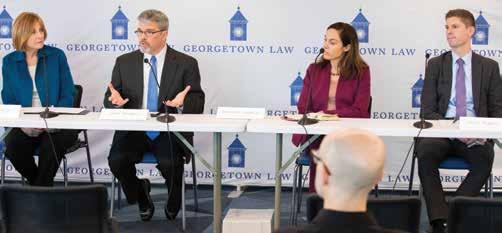
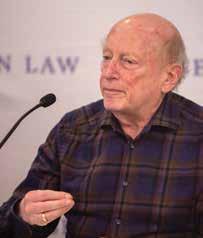
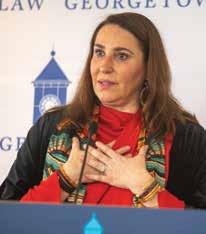
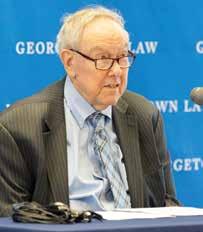
1: Lawyer Helen Wan, discussing her novel “The Partner Track,” which was made into a Netflix series.
2: Prof. Jane Stromseth moderating a conversation on the Law Center’s ongoing work supporting Ukrainian atrocity crimes prosecutors with International Criminal Justice Initiative Senior Director Amb. Clint Williamson and colleagues Ingrid Elliott, Davorka Colak and Irisa Cevra 3. Visiting Prof. Mary McCord, L’90, moderating a panel at the Journal of National Security Law & Policy Symposium on “Election Integrity as a National Security Imperative,” with panelists Monica Evans, D.C. Board of Elections, Ben Ginsberg of the Hoover Institution and Benjamin Hovland of the U.S. Election Assistance Commission.
4-7: Speakers at three different Human Rights Institute events: Harvard Law School Professor Mark Tushnet (4) at the “Russia After Putin” symposium; Rep. Jim McGovern (D-Mass.) (5) and environmental lawyer and activist Alfred Brownell (6) at the Samuel Dash Conference on “Protecting Environmental Defenders in an Age of Climate Emergency”; and Drinan Chair Soledad García Muñoz speaking on “The Age of Economic, Social, Cultural, and Environmental Rights.” 8. A discussion of “The National Security Challenges of Climate Change” with panelists Alice Hill of the Council on Foreign Relations, John Conger of the Council on Strategic Risks, Deb Loomis of the Office of the Secretary of the Navy and Will Rogers of the Department of the Army. 9. New York University School of Law Professor William Nelson, lecturing on “The Rule of Law: Its History and Continuing Importance.”
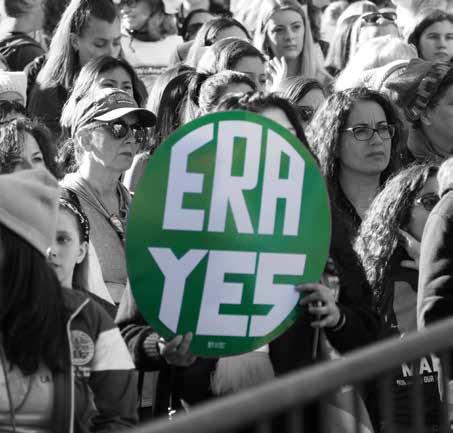
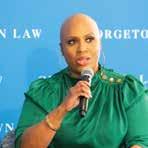
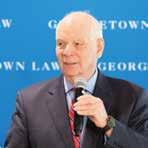
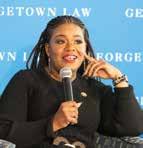
A proposed constitutional amendment for the protection of women’s equality, the Equal Rights Amendment (ERA), was introduced in 1923 and has progressed in fits and starts in the century since. In April, Georgetown Law partnered with the Columbia Law School ERA Project on a conference, “The Present and Future of the Equal Rights Amendment.”
In two keynote sessions, three members of Congress, Rep. Cori Bush (D-Mo.), Rep. Ayanna Pressley (D-Mass.) and Sen. Ben Cardin (D-Md.) championed renewed efforts to complete the ERA’s ratification. “Although it’s taken 101 years too long, we do have more momentum than we have had in 40 years,” said Pressley. “There is no time limit on equality,” said Cardin.
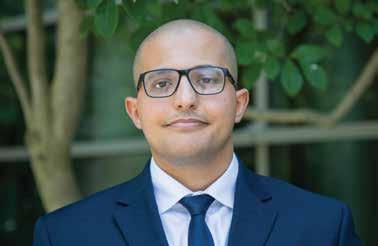
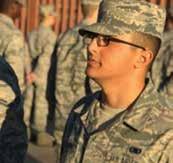
In June, the Pat Tillman Foundation named Karim Ibrahim, L’26, to its 2024 class of Tillman Scholars. Ibrahim, a veteran of the U.S. Air Force, is among 60 armed forces members, veterans and military spouses selected this year from a pool of nearly 1,600 applicants for the prestigious educational fellowship, which provides scholars with both financial support and opportunities for networking and leadership development.
Born in Egypt, Ibrahim came to the United States as a baby. His family was undocumented and he was ineligible for most college scholarships and loans. While working at a car wash, he heard a radio ad that led him to an Air Force recruitment office.
During his seven years on active duty, Ibrahim became a U.S. citizen and completed a college degree. He gained a new perspective on his immigration journey when he met Syrian refugees while stationed in Kuwait and developed new skills while managing an honor guard team in West Texas.
“The Air Force does a great job with training us to become future leaders. What the military gave me was more than I ever could have imagined,” he said. “I now feel more motivated to help people who don’t have a fair path to citizenship – and ultimately that is what segued into going onto this next journey into law school.”
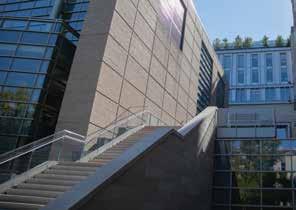

This new stairway, adjacent to the Scott K. Ginsburg Sport & Fitness Center, leads to the McCourt School of Public Policy building at 125 E St. NW, which officially opened this summer. Students and faculty from both schools appreciate the short-cut option when heading to events, meetings and classes on the other campus.
Participants in the McCourt School’s ceremonial ribbon-cutting in September included (L-R) Dean Maria Cancian, Kevin Smith of Robert A.M. Stern Architects, LLP, artist Maya Lin (who designed installations for the building), Washington, D.C.
Councilmember Charles Allen, Washington, D.C. Mayor Muriel Bowser, founding donor Frank McCourt, C’75, Protestant chaplain Rev. Ebony Grisom, Georgetown Board of Directors chair Thomas A. Reynolds III, B’74, and Georgetown Provost Robert M. Groves
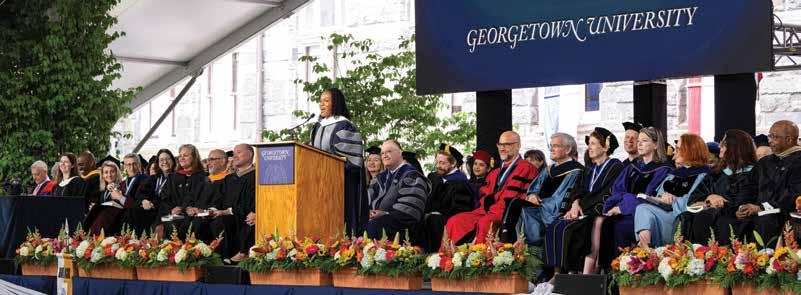
Imani Perry, L’02, H’24, a professor of women’s studies and African American studies at Harvard University, was the speaker at the Georgetown University Graduate School of Arts & Sciences commencement in May. Perry urged the assembled graduates to use their new degrees to benefit society. “I beg of you, please be kinder than the world we live in. Be your own miracle,” she said. Turn to page 26 for our report on the 2024 Georgetown Law commencement celebrations.
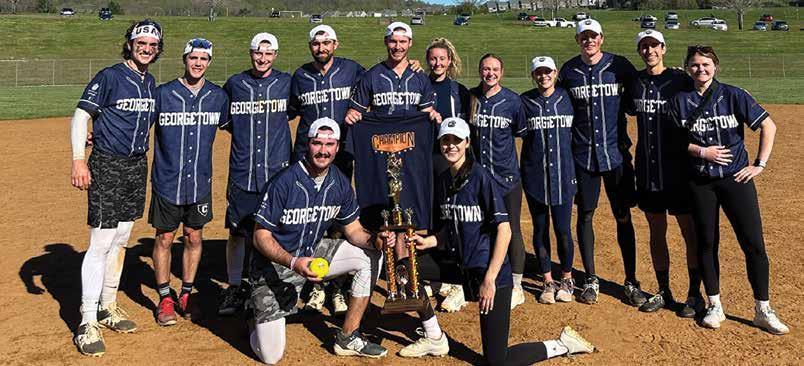
The Georgetown Law Softball Club won its first-ever championship in April at the 41st University of Virginia School of Law Softball Invitational. The club fielded four student teams and one alumni team for the tournament, which included 74 teams from 39 different law schools. The student team “Aiders and Abatters” was undefeated in all eight games they played, capping off their success with a 9-run comeback rally in the title game against the William & Mary Law School alumni team. Did you play softball as a student? Join the new Georgetown Law Softball Alumni group on LinkedIn!
Alumni are serving on the bench across the country and world; despite their different backgrounds, courts and legal systems, they are united in their commitment to public service.
by Rebecca Beyer
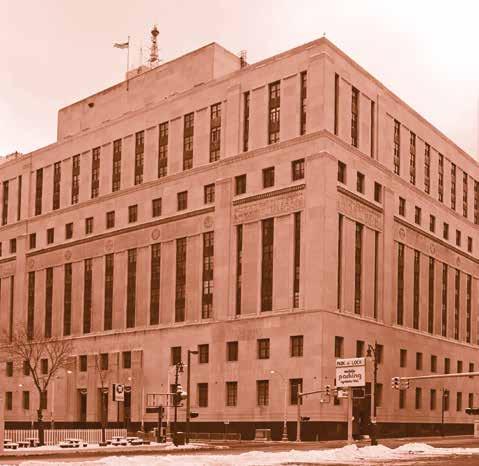
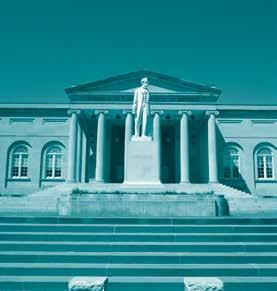
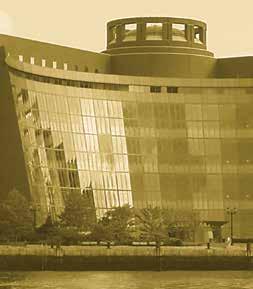
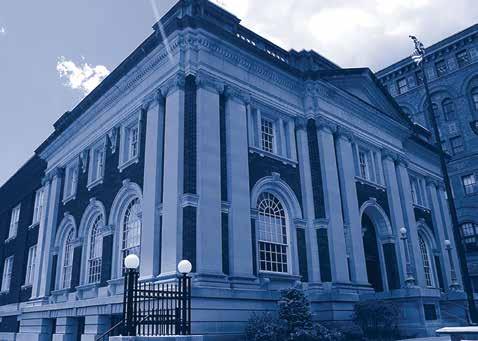
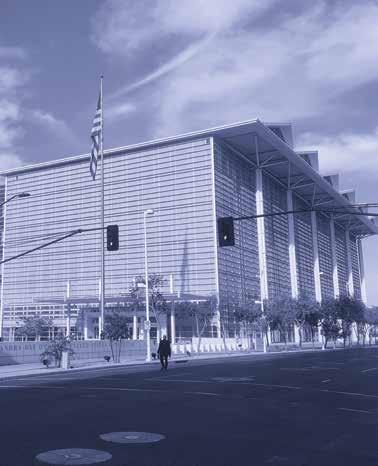
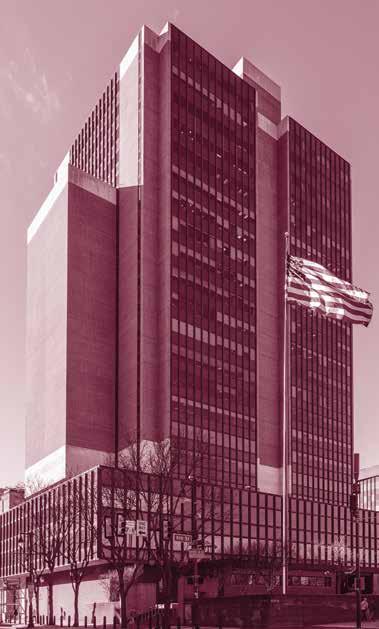
Before they became judges, they were prosecutors, public defenders, professors and attorneys in private practice. They were appointed to the bench by governors and by presidents ranging from George W. Bush and Donald Trump to Barack Obama and Joe Biden. One was nominated to his seat by Trump and Biden. Two were sent to Georgetown Law in preparation for taking the bench in their own country, the United Arab Emirates. One left the home she had made in the United States to become a judge in her country, Albania.
The personal and professional backgrounds of the many Georgetown Law alumni who have taken the bench across the United States and world –conservatively estimated at nearly 500 in 47 states, two territories and at least 15 countries – are unique in nearly every way.
But the judges share something too, something many of them trace back to their days on campus, long before they knew they would be making decisions about people’s lives and resolving complicated cases involving state, federal and constitutional law. What they have in common is a commitment to public service. And that commitment guides them – and fulfills them – as they pursue the difficult work of dispensing justice.
“Every day I feel like I’m upholding the rule of law – part of what has made this country the envy of the world,” says Third U.S. Circuit Court of Appeals Judge Thomas M. Hardiman, L’90. “I love being a small piece of that effort.”
After relocating to the United States to be with her parents, Holta Zaçaj, L’08, a former human
rights lawyer, moved back to Albania to become a judge in the wake of judicial reforms the country completed as part of its process of joining the European Union. She was elected president of the country’s Constitutional Court in 2023 and also serves as president of the Conference of European Constitutional Courts.
“As a human rights lawyer, this is the maximum opportunity to make a difference – to contribute to a country that has shown such a great commitment to rule of law through its reforms,” she explains. “I still feel honored and privileged.”
Before she went to law school, Connecticut Appellate Court Judge Nina F. Elgo, L’90, twice took an aptitude test that said she should become a judge. Before he joined the judiciary in the United Arab Emirates, 2013 LL.M. graduate Mohamed Almarzouqi’s father asked him why he wasn’t a judge. Others had friends and colleagues urge them to seek appointments to
the bench. But none of the dozen jurists interviewed for this article actually planned to become a judge.
“At the end of my first clerkship, I thought, ‘I want to do that,’” Eastern District of Michigan Judge Jonathan J.C. Grey, L’07, remembers, laughing. “And I shared it with [my judge], and he was like, ‘Great. It’s like being struck by lightning.’ He told me to focus on enjoying my career, not the destination.”
Seth R. Aframe, L’99, who was confirmed to the First U.S. Circuit Court of Appeals in May, agrees.
“You can’t plan to be a judge; that’s just a waste of energy,” he says. “Every judicial nomination is its own particular political package. What they’re looking for changes depending on the circumstances. I guess I fit what they were looking for at that time.”
Elgo says that, paradoxically, what qualifies her for the role is something she is not. “I think the best judges are those who are not judgmental, and I feel like that is probably one of my assets,” she says.
Still, many judges point to the role that mentors played in their decision to join the bench. And, for some Georgetown jurists, those mentors were other current or former Georgetown jurists. Sometimes the Georgetown connection continues down the line. Former District of Columbia Superior Court Chief Judge Anita Josey-Herring, L’87, clerked for Judge Herbert B. Dixon, L’73, who clerked for the late Judge H. Carl Moultrie, L’56, (Josey-Herring, the D.C. Superior Court’s first woman chief judge, sits in the courthouse named for Moultrie, who was the court’s first Black chief judge).
Josey-Herring says her experience with Dixon was part of the reason she decided to pursue a judgeship later in her career.
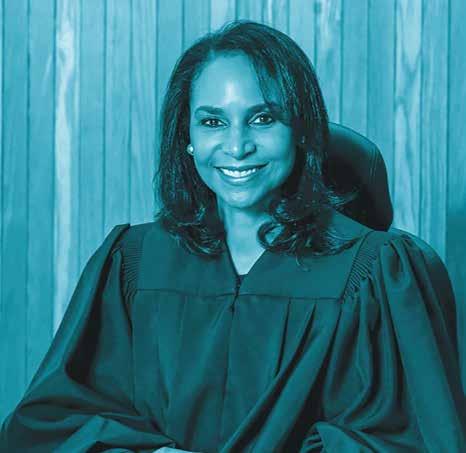
“I do think Georgetown really focuses on making society a better place for us all, and to some extent my career has mirrored those values.”
— Anita Josey-Herring, L’87, Former District of Columbia Superior Court Chief Judge
“He was very bright and always prepared on the bench,” she remembers. “I liked the way he controlled his courtroom, and I appreciated the time he took to speak with me about individual cases.”
Aframe spent four years clerking for First Circuit Judge Jeffrey R. Howard, L’81, and filled his mentor’s seat when Howard took senior status.
“Judge Howard is one of the most humble people I’ve ever met,” Aframe says. “He gives people the benefit of the doubt; he assumes any information he did not know would have put that person in a good light. I’ve tried to emulate all of those things.”
District of Columbia Court of Appeals Judge John P. Howard III, L’10, says Grey has been a mentor for him, and both men point to the influence of Adjunct Professor of Law David C. Simmons, former chief administrative law judge for the D.C. Commission on Human Rights. Simmons taught Howard in an employment discrimination class, and the next academic year Howard rearranged his schedule so that he could clerk for the judge on the commission during the day. In 2014, after just a few years in private practice, Howard was appointed to the commission himself.
“I first met Judge Simmons at a Meet-theBlack-Professors night that the [Black Law Students Association] hosts,” Howard remembers. “People said, ‘This guy is tough. He’s not going to cut you any slack. But no one is going to mentor you or care for you like he will.’”
Grey said Simmons was one of his first calls when he found out he had a clerkship interview a couple of years after graduating.
“I was scared, and he said, ‘You got an interview; no judge is going to waste their time interviewing someone [if they’re not qualified for the job],’” Grey remembered. “He has been a person that has encouraged me all along the way.”
For judges at all levels, making decisions – or writing dissents as appellate judges – in highprofile or controversial cases is one of the most challenging parts of the job.
Josey-Herring, who recently took senior status after some 30 years on the bench, says she handled each case “as fairly as I humanly could.”
“I took an oath to treat all people with dignity and respect, and I’ve tried to do it straight based on the facts and the law,” she says. “Whether people ultimately disagreed with the result or not, I can rest well at night.”
Viewing their work as one part of a longer judicial process can help.
“I do my best; I write it as clearly as I can, and that’s it,” Aframe says. “They have options – en banc, the Supreme Court. That’s the system. To the extent I’ve woken up at night thinking about something, it’s not something I already did; it’s something I’m doing.”
Aframe and other appellate judges also have the benefit of a collective decision-making process.
“That can draw the process out and require more discussion, but, when it comes to that hard case, knowing that you’ve got two other judges there who have read everything and can lean on their unique experiences too and share the responsibility with you – it feels like you can get to a better decision,” J.P. Howard says. “It takes some of the pressure off.”
But the pressure is always present because, as almost every judge says, each case – no matter how big or small – is important to the people involved.
University of Baltimore Professor of Law Gregory Dolin, L’04, sat for two years as an associate justice on the Supreme Court of the Republic of Palau, an island country in the western Pacific Ocean, after applying for and being appointed to the role by the country’s president.
“When I am reading the decisions of other judges, I don’t look at who appointed them. I am hopeful that individuals will continue to believe that judges want to reach the fairest conclusion, without regard to race, political party or any particular category.”
— Jonathan J.C. Grey, L’07, Judge, Eastern District of Michigan
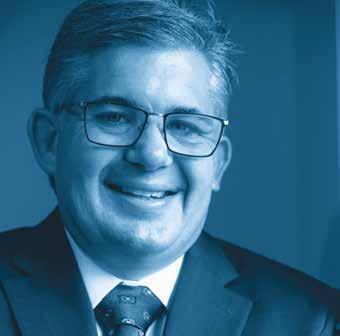
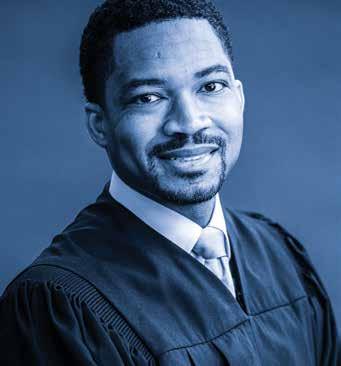
“You can’t plan to be a judge; that’s just a waste of energy. Every judicial nomination is its own particular political package. What they’re looking for changes depending on the circumstances. I guess I fit what they were looking for at that time.”
— Seth R. Aframe, L’99, Judge, First U.S. Circuit Court of Appeals
1. The Hon. M. Margaret McKeown, L’75, H’05, U.S. Court of Appeals for the Ninth Circuit, on campus giving a talk on her 2022 book Citizen Justice: The Environmental Legacy of William O. Douglas
2. The Hon. Virginia M. Hernandez Covington, L’80, U.S. District Court for the Middle District of Florida, member of the Law Center Board of Governors.
3. The Hon. Zia M. Faruqui, C’01, L’04, U.S. District Court for the District of Columbia, hosting a group of students during RISE pre-orientation.
4. The Hon. Patricia A. Seitz, L’73, U.S. District Court for the Southern District of Florida, sits on the Law Center Board of Governors.
5. In October, Georgetown Law hosted an event in Manhattan honoring alumni judges in New York. Attendees included (L-R): The Hon. Kenneth Karas, C’86, P’25, U.S. District Court for the Southern District of New York, the Hon. John Cronan, C’98, U.S. District Court for the Southern District of New York, the Hon. Dineen Riviezzo, L’92, Acting Justice for the Supreme Court of the State of New York, Kings County, Criminal Term, the Hon. Thomas Carroll, C’66, L’70, New York State Supreme Court (ret.), the Hon. Kiyo Matsumoto, L’81, U.S. District Court for the Eastern District of New York, the Hon. Joseph Bianco, C’88, Second Circuit Court of Appeals, the Hon. Noel Brennan, L’85, United States Immigration Court, Dean William M. Treanor, the Hon. Timothy Stanceu, L’79, U.S. Court of International Trade, the Hon. Anne Nardacci, C’99, U.S. District Court for the Northern District of New York, the Hon. Joel Cohen, L’86, Acting Supreme Court Justice for New York County, Commercial Division, the Hon. Pamela Chen, L’86, U.S. District Court for the Eastern District of New York, the Hon. Hasa Kingo, L’10, Manhattan 5th Municipal Court District, New York County Civil Court and the Hon. Robert Miller, L’74, Associate Justice for the Supreme Court of the State of New York, Appellate Division.
6. The Hon. Thomas Ambro, C’71, L’75, U.S. Court of Appeals for the Third Circuit, is a past member of the Board of Visitors and has also taught public speaking to Georgetown undergraduates as an adjunct professor.
7. The Hon. Arthur Gajarsa, L’67, H’12, U.S. Court of Appeals for the Federal Circuit (ret.) and former member of the Board of Governors, with wife Melanie at the event honoring him and other recipients of the 2016 Georgetown University Alumni Association’s John Carroll Awards.
8. The Hon. Thomas Hogan, C’60, L’66, U.S. District Court for the District of Columbia, speaking at a January event with the Institute for Constitutional Advocacy and Protection.
9. The Hon. Loren AliKhan, L’06, U.S. District Court for the District of Columbia, with fellow alumni clerks Perry Cao, F’17, L’20, Grace Fuscoe, L’21 and Mark Wigley, L’20.
10. At his 45th reunion, The Hon. James Robart, L’73, U.S. District Court for the Western District of Washington, discussed his decision to block the Trump Administration’s 2017 Muslim travel ban.
11. The Hon. D. Michael Fisher, C’66, L’69, U.S. Court of Appeals for the Third Circuit, has taken 22 Georgetown Law alumni as clerks.
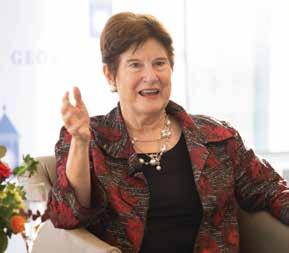
12. Center: The Hon. Timothy Kelly, L’97, U.S. District Court for the District of Columbia, who recently joined the Board of Visitors, with Dean Treanor and Prof. Stephanie Barclay at an October event for the Georgetown Center for the Constitution. 1 4 10 7
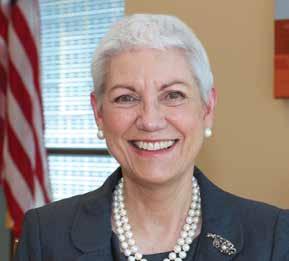
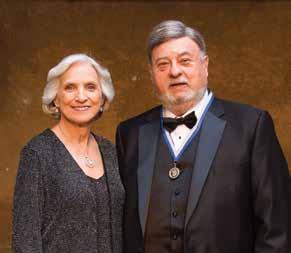
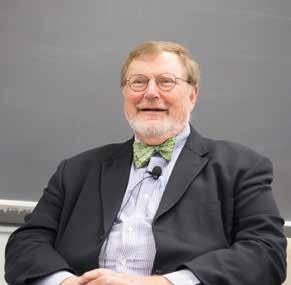
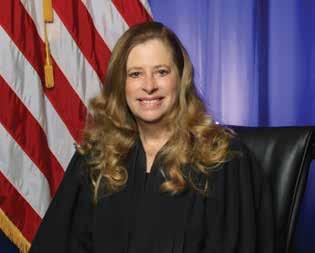
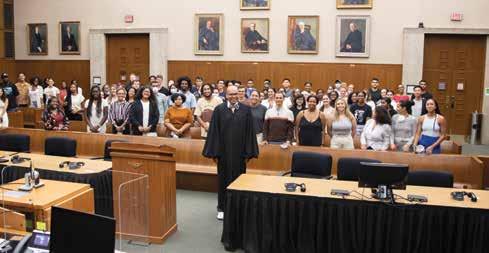
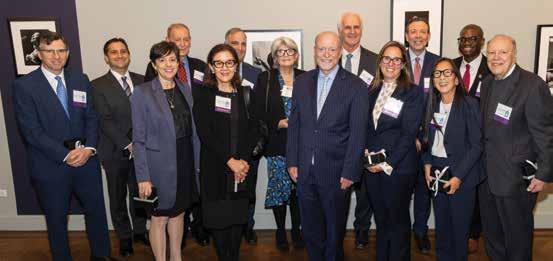
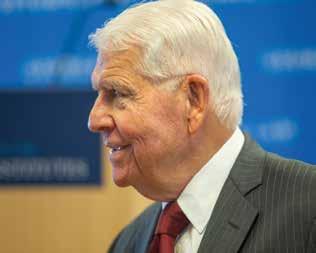
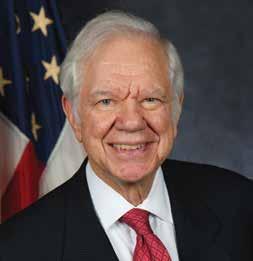
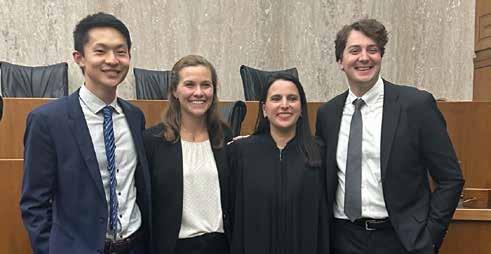
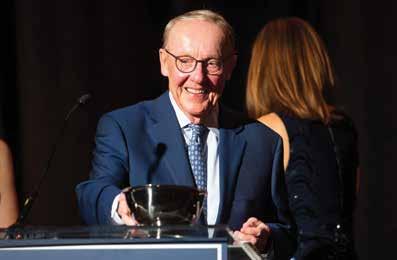
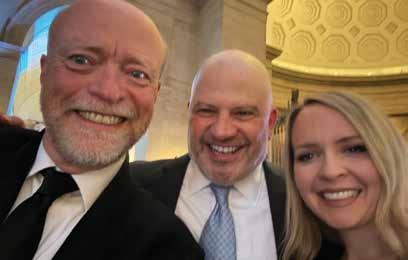
“There’s a certain confidence that going to Georgetown gives you – the quality of the faculty and the students – but also the connections to public service and being in the capital.”
— Terrence G. Berg, F’81, L’86, Judge, Eastern District of Michigan
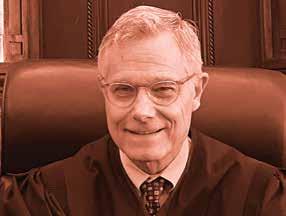
“As a human rights lawyer, this is the maximum opportunity to make a difference – to contribute to a country that has shown such a great commitment to rule of law through its reforms. I still feel honored and privileged.”
— Holta Zaçaj, L’08, President, Albanian Constitutional Court
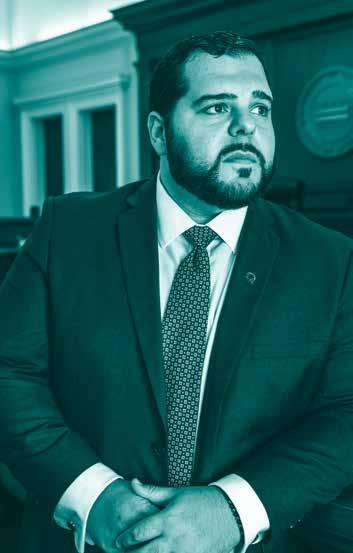
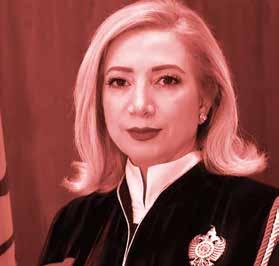
“When it comes to that hard case, knowing that you’ve got two other judges there who have read everything and can lean on their unique experiences too and share the responsibility with you –it feels like you can get to a better decision.”
— John P. Howard III, L’10, Associate Judge, District of Columbia Court of Appeals
“In Palau, a lot of disputes are fairly minor by American standards – run-of-the-mill contract or property disputes,” he says. “But they are extraordinarily important to the people [on either side].”
Dolin says he always tried to “write for the litigants.”
“They deserve to know, in sufficiently clear detail, why they won or lost – and, if they lost, that they were listened to,” he says.
For a similar reason, Eastern District of Michigan Judge Terrence G. Berg, F’81, L’86, says he tries not to dismiss a case without a hearing.
“That’s not my preferred situation,” he says. “I want to make sure that the parties who bring their suits feel that they’re getting their day in court.”
For many trial judges, sentencing is the most difficult responsibility they have.
“You are [potentially] separating a person from their liberty,” Grey explains.
U.S. District of Arizona Judge Jennifer G. Zipps, L’90, agrees.
“You’ve got people’s lives and their families’ lives in your hands,” she says. “You want to make the best decision given the circumstances – one that allows for just punishment, deterrence and rehabilitation.”
It seems impossible to talk about judges or judging in the United States today without acknowledging the extremely polarized political climate in the country. In 2007, after President George W. Bush nominated Hardiman, he was confirmed by the Senate 95-0. By contrast, when Aframe, a Biden nominee, was confirmed in May of this year, he received the support of only two Republican senators in a vote that was nonetheless hailed as “bipartisan.”
Rhetorical attacks on the judiciary from politicians have had real-world consequences for judges and the public alike. Threats against federal judges are way up – more than doubling in the last three years, according to the U.S. Marshals
Service; meanwhile, trust in the judiciary is way down, with less than half of Americans holding “a great deal” or a “fair amount” of confidence in the courts (the judicial branch remains more trusted than the executive and legislative branches of government).
Apart from worrying about the safety of colleagues on the bench, “I definitely have a lot of concerns for the rule of law,” Elgo says.
Hardiman, who was on Trump’s short list for the U.S. Supreme Court, compared the federal judicial nomination and confirmation process to national security policies that have emerged by necessity in a nuclear-armed world.
“The benefit of mutual assured destruction is that nobody launches a weapon,” he says. “Confirmation battles are the inverse of that. Because the world is not going to blow up, the process is increasingly degraded over time by partisan sniping.”
As for remedies, a kind of informal and formal exposure therapy may be one option. Many judges point to their experience with jurors, who often express an increased respect for the judicial system after serving within it. Keeping in mind their ethical obligations, judges may have to more intentionally educate the public about their role, some judges say.
“I think the solution is to have more communication and more civics training and more discussion about the issues,” Zipps says, adding that she shared excerpts of one U.S. Supreme Court decision with a family member who didn’t understand how it was being applied. “Once you can explain how cases are decided and what [lawyers] have to prove or not prove, that builds more confidence in the courts. When you can point to actual text and have a conversation, that results in a deeper understanding and respect for the system.”
Aframe, who is involved in civics education efforts with young people in New Hampshire and as part of a new First Circuit civics project, agrees.
“Does the next generation of judges need to be more forward-leaning, talking to different groups
“Once you can explain how cases are decided and what [lawyers] have to prove or not prove, that builds more confidence in the courts. When you can point to actual text and have a conversation, that results in a deeper understanding and respect for the system.”
— Jennifer G. Zipps, L’90, Chief Judge, U.S. District of Arizona
of people to explain what we do and how we do it?” he asks. “That’s something I think about.”
For better or worse, Aframe says, judicial selection at the federal level is “a political process.” But that isn’t necessarily because of the people wearing the robes.
“Once you get the job, it’s a non-political job,” he says.
Grey agrees.
“When I am reading the decisions of other judges, I don’t look at who appointed them,” he says. “I am hopeful that individuals will continue to believe that judges want to reach the fairest conclusion, without regard to race, political party or any particular category.”
Although the alumni interviewed for this article didn’t know they would become judges when they were students at Georgetown, the school nonetheless prepared them for their work on the bench – in part because it prepared them for public service, period.
Most went to law school because they wanted to make an impact. They found the resources at Georgetown to do so. But more than any one class or externship or professor, they point to a collective sense of responsibility instilled in them at Georgetown that they have carried with them throughout their careers and onto the bench.
“Georgetown is a school with a commitment to service first – to be ‘men and women for others,’” says District of Columbia Court of Appeals Judge Howard. “That ethos and that spirit prepare you for public service, especially when you have to step out of the role of being an advocate.”
Josey-Herring agrees.
“I do think Georgetown really focuses on making society a better place for us all, and to some extent
my career has mirrored those values,” she says. “My first-rate education at Georgetown Law Center gave me a solid education, was essential in the development of my critical thinking skills and enabled me to positively impact the legal profession.”
As rare as judgeships are, at Georgetown, lightning apparently can strike twice… and many more times at that. Josey-Herring counts two classmates, Alfred S. Irving, Jr., L’87, and Erik P. Christian, L’86, on the District of Columbia Superior Court. Grey is in the same building as Berg in the Eastern District of Michigan. Hardiman is one of four Georgetown Law Hoyas on the Third Circuit. Almarzouqi and his classmate Hossam Alyammahi serve on the same court in the United Arab Emirates. And that’s just scratching the surface.
There is also the reality that, as students studying at, as Hardiman puts it, “the best law school in the most important city in the world,” they could see – and learn from people in – the careers they were beginning to imagine. Grey and Howard saw their future in Simmons; Josey-Herring was drawn to something in the chambers of Dixon; Berg was a research assistant for the late Professor Father Robert F. Drinan, a former member of Congress. All that proximity made becoming a member of a coequal branch of government a possibility.
“The kinds of classes I was taking and the kinds of people I was taking classes with – they’re of this world,” Aframe says. At Georgetown, “I put myself in the lane.”
Berg agrees.
“There’s a certain confidence that going to Georgetown gives you – the quality of the faculty and the students – but also the connections to public service and being in the capital,” he says. “You feel like you are part of all that. You feel that you fit into the bigger system. It all seems more reachable.”
The Honorable Virginia M. Hernandez Covington, L’80, U.S. District Court for the Middle District of Florida
The Honorable Zia M. Faruqui, C’01, L’04, U.S. District Court for the District of Columbia
The Honorable Anita Josey-Herring, L’87, Superior Court of the District of Columbia
The Honorable Timothy Kelly, L’97, U.S. District Court for the District of Columbia
The Honorable Patricia A. Seitz, L’73, U.S. District Court for the Southern District of Florida
The Honorable M. Margaret McKeown, L’75, H’05, U.S. Court of Appeals for the Ninth Circuit
The Honorable Thomas Ambro, C’71, L’75, U.S. Court of Appeals for the Third Circuit
The Honorable Arthur Gajarsa, L’67, H’12, U.S. Court of Appeals for the Federal Circuit
The Honorable John P. Howard III, L’10, District of Columbia Court of Appeals
The Honorable Joseph Laplante, C’87, L’90, US District Court for the District of New Hampshire
The Honorable Rodolfo A. Ruiz II, L’05, US District Court for the Southern District of Florida
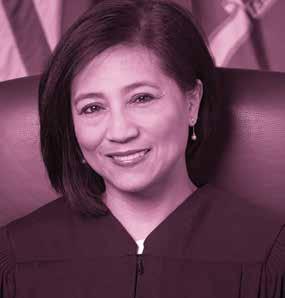
“I think the best judges are those who are not judgmental, and I feel like that is probably one of my assets.”
— Nina F. Elgo, L’90, Judge, Connecticut Appellate Court
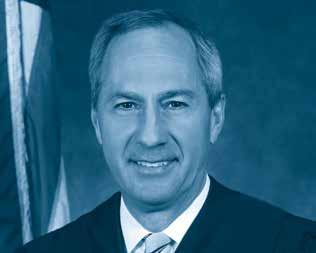
“Every day I feel like I’m upholding the rule of law – part of what has made this country the envy of the world. I love being a small piece of that effort.”
—
Thomas M. Hardiman, L’90, Judge, Third U.S. Circuit Court of Appeals
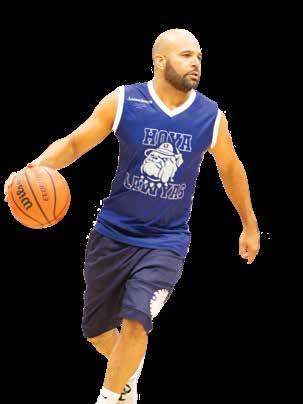
In the 37th annual Home Court basketball match, students, faculty and staff from Georgetown Law faced counterparts from the George Washington University Law School. The Hoya Lawyas beat the Rowdy Revs 73-54 — and the Washington Legal Clinic for the Homeless took home a check for $788,982.50. Most past games saw Georgetown take on a “Hill’s Angels” team of Capitol Hill staffers and sometimes Members of Congress, but this may be a new tradition. What better way to earn bragging rights as the finest law school in the nation’s capital?

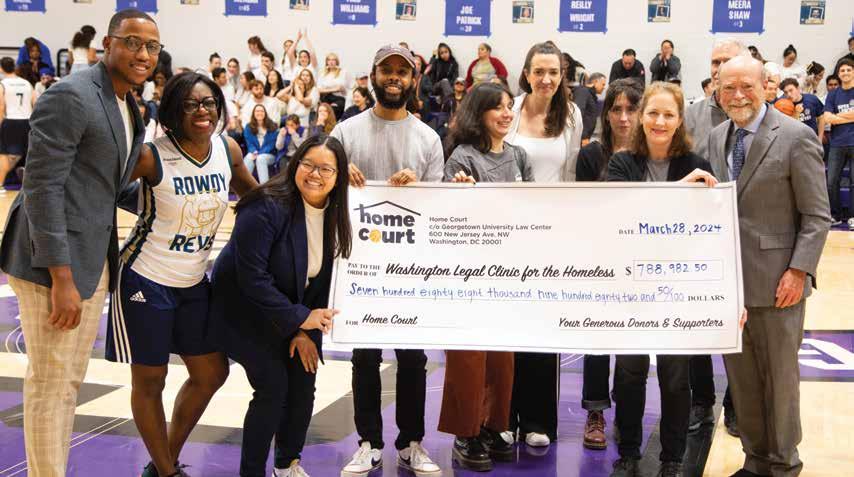
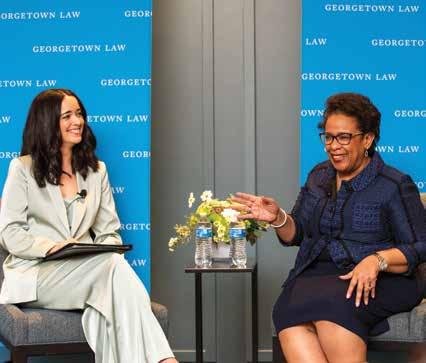
At The Georgetown Law Journal’s 11th annual alumni banquet on April 24, former U.S. Attorney General Loretta Lynch called upon participants to remember the power of the law to protect people and secure justice. Living up to these ideals, she said, “is our highest and best purpose as lawyers – and in my view, as citizens.”
More than 190 current and former editorial staff representing 23 volumes, faculty and friends of the Journal attended the cocktail reception and celebratory dinner. In her remarks, outgoing Editor-in-Chief Alexis Marvel, L’24, shared similar sentiments. “As lawyers, we have the capacity to inflict great harm. But we also have the capacity to prevent it,” she said.
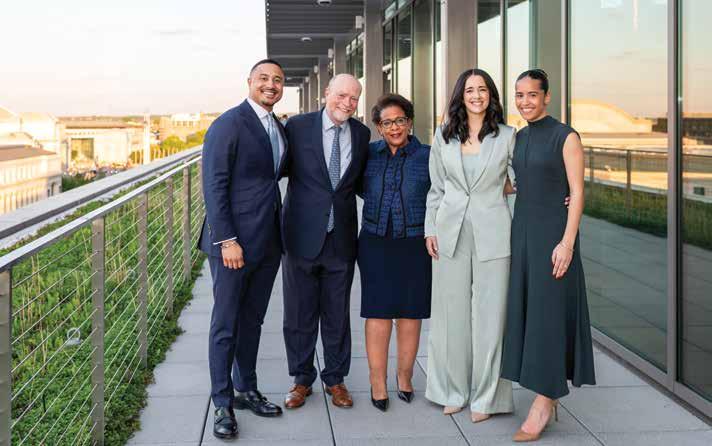
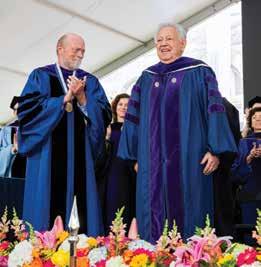
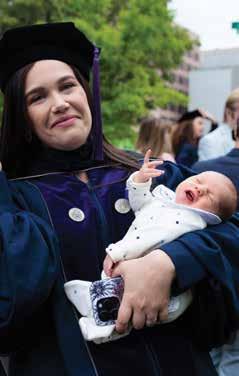
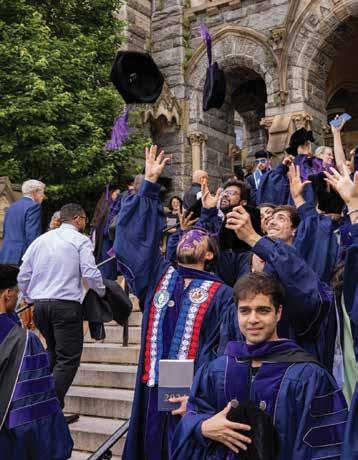
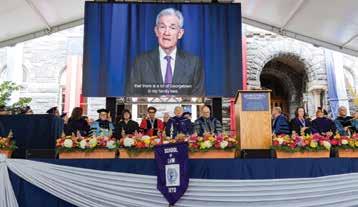
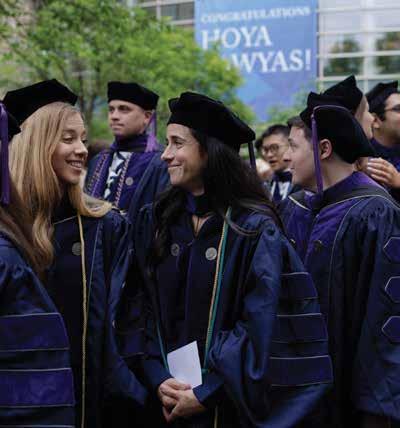
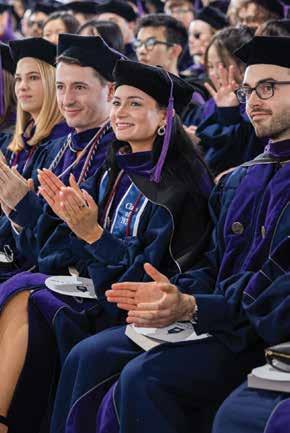
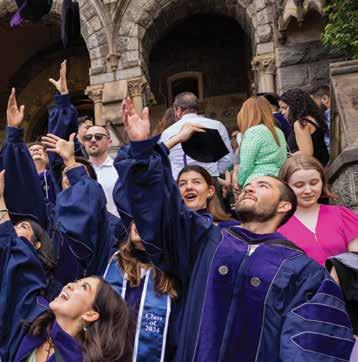
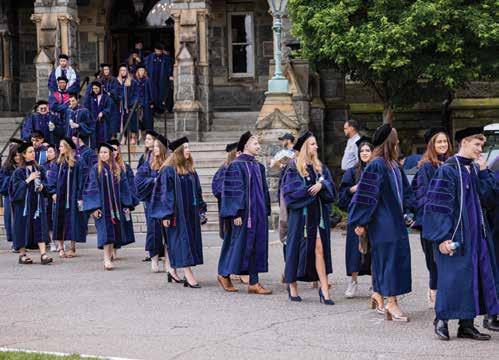
On May 19, 641 J.D., 516 LL.M. and 8 S.J.D. candidates gathered on Georgetown University’s historic campus to celebrate the granting of their hardearned degrees. Federal Reserve Chair Jerome Powell, L’79, H’24 – who delivered remarks virtually while recovering from COVID-19 – urged the graduates to keep taking on new challenges. “Your formal education may end today, but you are not done learning,” he said.
The audience appreciated his advice, as well as his memories of dancing the “Time Warp” at midnight screenings of The Rocky Horror Picture Show. The graduates and their guests also cheered for a second honorary degree recipient, Philip Hirschkop, L’64, H’24, a civil rights lawyer best known for his Supreme Court victory in the landmark 1967 interracial marriage case Loving v. Virgin-
ia. “Throughout his career, Hirschkop chose to represent clients based on his principles, no matter the risk,” Professor Sheryll Cashin said in her introduction.
Before the Hilltop ceremony, the Law Center campus hosted two Celebration Days, where smaller groups of professors and graduates gathered to present and receive their diplomas… and took lots and lots of photos. Student speaker Wala Hassan, L’24, shared that her academic journey had started in Head Start, the federal preschool program for low-income families, which made it extra meaningful that at Georgetown, she’d taken a poverty law class from Professor Peter Edelman, one of Head Start’s founders. “Meeting Professor Edelman made me realize that at the crux of everything is a lawyer. Lawyers are on the forefront of change,” she said.
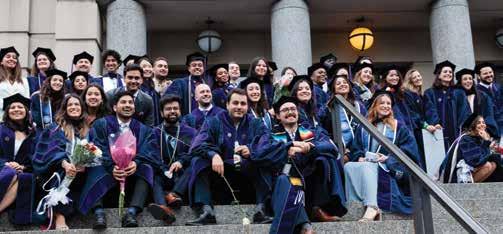
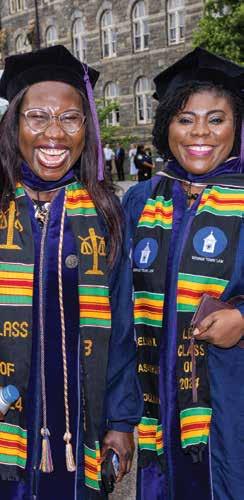
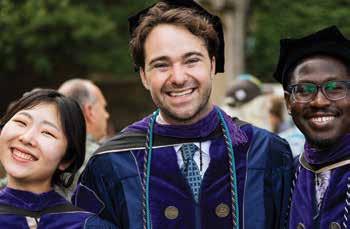
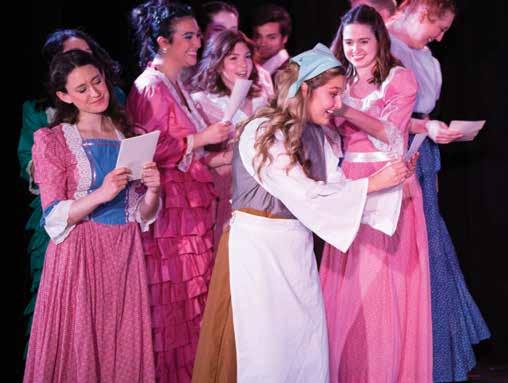
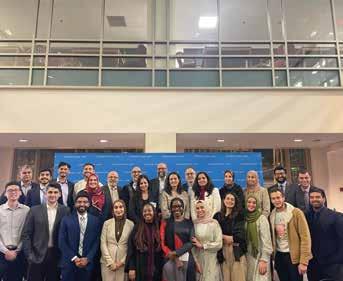
1 & 2. Fairytales come true! In April, the Georgetown Gilbert and Sullivan Society presented Rodgers & Hammerstein’s Cinderella 3. During Ramadan, the Georgetown Muslim Law Students Association hosted their first alumni-student iftar gathering, in what they hope is a new tradition in the making. 4. In March, the Georgetown Jewish Law Students Association welcomed students, alumni, faculty and staff to their annual Spring Shabbat Dinner. 1 3 2 4
2
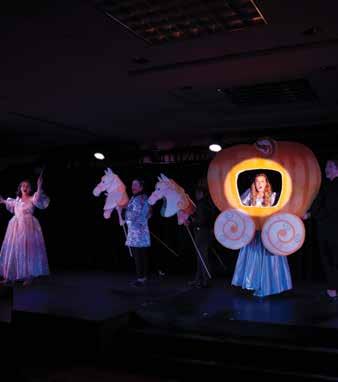
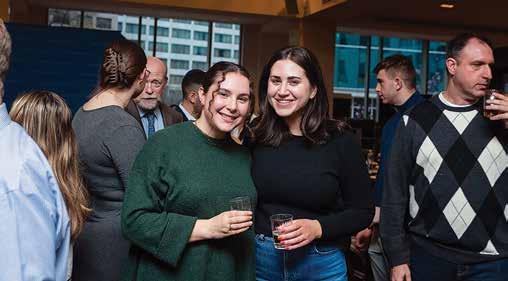
During the April 8 solar eclipse, Washington was not in the “zone of totality” – still, the partial eclipse was impressive enough to draw students and faculty outdoors to experience it (using protective eyewear, of course).
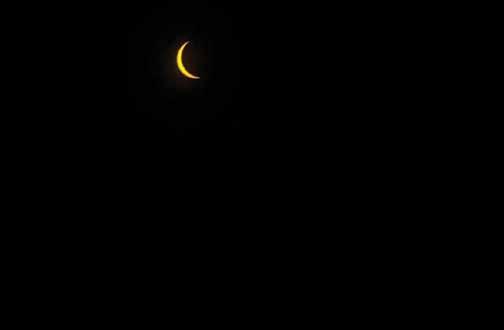
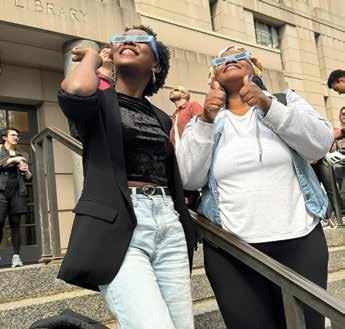
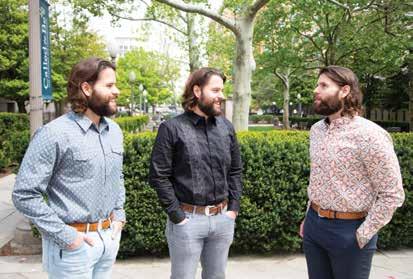
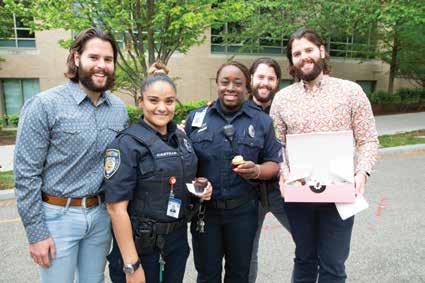
In addition to their Georgetown Law J.D.s, identical triplets Nicholas, Zachary and Benjamin Osborne, G’20, L’24, earned MBAs from the George Washington University in May. Juggling two campuses and two degrees simultaneously required a system that Benjamin calls “organized chaos.” One strategy? Taking all the same classes.
The North Carolina natives say that being triplets acts like a built-in icebreaker, allowing them to connect with people they might not otherwise have the chance to meet. “People say, ‘Wow, I’ve never met triplets before — you’re so special,’” explains Zachary. “We say, ‘Well, there are three of us, but only one of you. So you are way more special than we are.’”
The brothers first moved to Washington to earn master’s degrees in economics from Georgetown in 2020. Between their universities and the relationships they’ve formed at their church, they say the nation’s capital now feels like home. They prize their Capitol Hill externships with the Senate Committee on Homeland Security and Government Affairs and the office of Senator Tim Scott (R-S.C.). As of publication time, they are still finalizing their next steps as they plan careers in public service. “With our Georgetown law degrees, we’ve been able to really discover who we are,” says Nicholas. “What we want to do is to help people.”
Find a video of the triplets reflecting on their last day of classes at the Georgetown Law YouTube account.
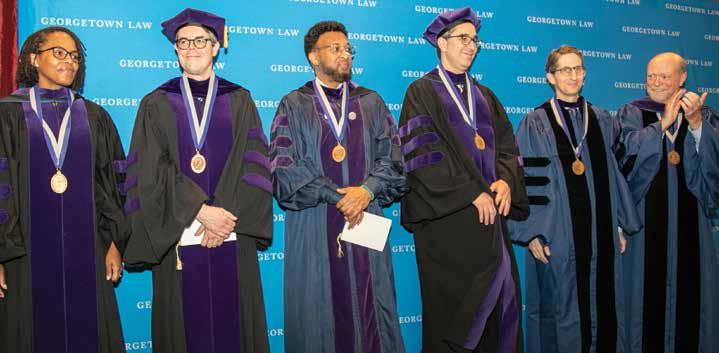
professorship ceremony.
In February, Georgetown Law honored five faculty members with named professorships: Anthony Cook, the Reynolds Family Endowed Service Professor, Itai Grinberg, the Carmack Waterhouse Professor of International Economic Law, Michael Pardo, the Scott K. Ginsburg Professor of Evidence Law, Alicia Plerhoples, the Paul and Patricia Saunders Professor in Business Law and Brad Snyder, the St. Thomas More Professor in Law and History.
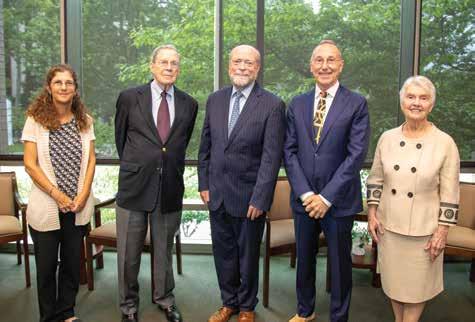
In May, Georgetown Law celebrated the careers of six retiring members of the faculty: Susan Low Bloch, Diana Roberto Donahoe, L’90, Peter B. Edelman, Susan Deller Ross, Craig Hoffman and Heidi Li Feldman
Since our founding, Georgetown Law has been known as the best place in the U.S. to pursue a law degree while still employed full-time. It isn’t easy, but today’s evening students make it work in amazing ways! This fall, Georgetown enrolled a record 68 students in the evening program. Earlier this year, four evening students gave us a glimpse into their busy lives.
Michael-Joseph Richardson, L’24, consults for Microsoft on cloud computing migrations. He mostly worked with European firms so he could complete a full work day in an earlier time zone before heading to campus. With his new expertise in cybersecurity, he hopes to bridge the gap between tech and law. “You’re all more collaborative with each other. There’s less competition, since you have more perspective,” he said of finding camaraderie among classmates.
Katherine Hoops, L’25, is on the faculty at Johns Hopkins School of Medicine, where she’s an attending physician in the pediatric ICU. A highlight of her time at the Law Center was an independent study on hospital-based violence prevention with the Center for Innovations and Community Safety. “It was super inspiring to work that we’re trying to replicate in Baltimore,” she said.
Kelly Heesch Sharbo, L’25, is a consultant managing a 200-person contract of engineers and logisticians who support the
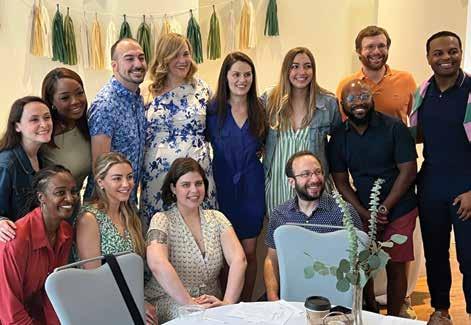
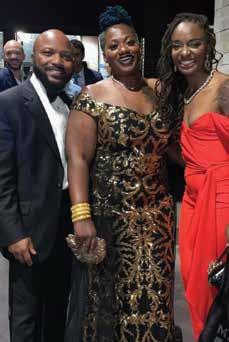
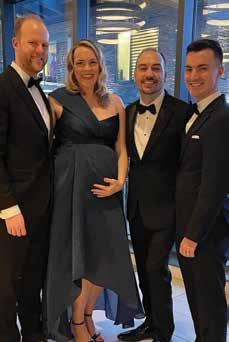
Navy and Marine Corps. She also gave birth right after her 1L finals, and by the end of the summer was taking part in the annual On Campus Interviews program for law firm jobs. “Timing was very, very good,” she quipped.
Maurice “Moe” Roberson, L’25, a Washington, D.C. native and veteran of the Massachusetts Army National Guard, is now “trucking along” as a trucking business owner and future lawyer. During
his 1L year, he would wake up at 1 a.m. to head to a Baltimore freight depot, make his deliveries, sleep from about 8 a.m. until noon, spend the next eight hours on homework and classes, then catch a little more sleep until the next wake-up call. When he can, he and his family love to host classmates for cookouts. “We’re all working big-time jobs and supporting our personal lives and embarking on this law school journey,” he said.
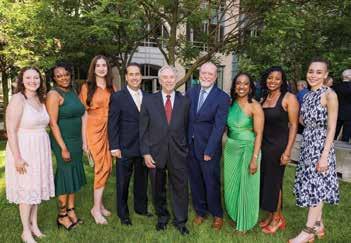
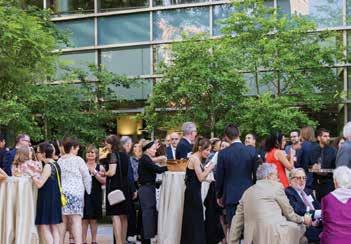
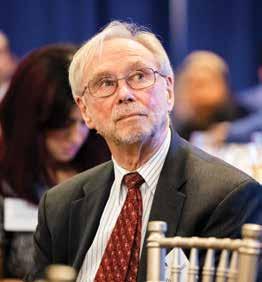
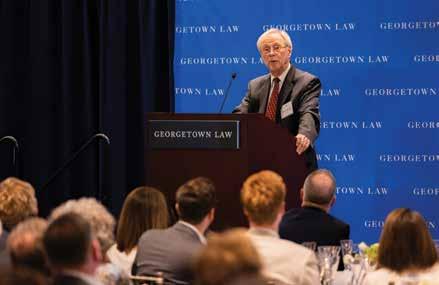
As reported in our Spring 2024 issue, Georgetown Law’s Juvenile Justice Clinic (JJC) recently marked its 50th anniversary. To mark the occasion, current and past JJC leaders, Clinic alumni and other friends and supporters gathered on campus June 1 for a celebration dinner. It was also an opportunity to honor founding direc-
tor Professor Wallace Mlyniec, L’70, who has announced he’ll retire at the end of the current academic year. Our congratulations to all who have contributed to the life-changing impact this clinic has had on young people in Washington, D.C. and beyond.
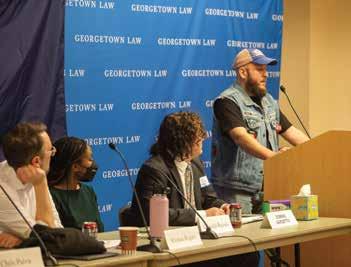
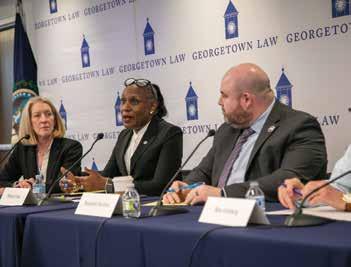
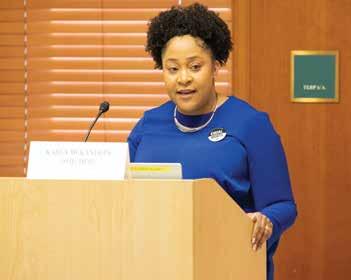
Most of Georgetown Law’s 12 student-run journals take the opportunity every other year to host a symposium spotlighting timely topics and scholarship related to their areas of interest. Recent events included:
The Future of Work: The Intersection of Poverty and Labor Symposium, organized by The Georgetown Journal on Poverty Law and Policy and co-sponsored by the Workers’ Rights Institute, Center on Poverty and Inequality and Center on Privacy and Technology. Symposium editor Joe Anderson, L ’24, said he enjoyed bringing together a variety of perspectives to create what he termed “a rich portrait of what labor in 2024 looks like.”
70 Years Later: Revisiting Brown v. Board of Education and the Struggle for Racial Equity in Education, hosted by the Georgetown Journal of Law & Modern Critical Race Perspectives and co-sponsored by the Office of Journal Administration, Racial Justice Institute, Racial Equity in Education Law and Policy Clinic and several student organizations. Journal editors used the anniversary of the landmark Supreme Court decision on public school desegregation to focus on the history of racial equity in education.
Election Integrity as a National Security Imperative: Current and Future Challenges to Securing American Elections, organized by the Journal of National Security Law and Policy and co-sponsored by Georgetown Law’s Center on National Security. Speakers and panelists discussed lessons learned from the 2020 election and how to use them to protect future elections. Symposium editor Caitlyn Johnson, L’24, was grateful for support from the Georgetown Law alumni community. “We relied on alumni from government agencies, firms and think tanks as we were developing our panels, and it was a real privilege to get to meet so many of them and see the way Georgetown Law continues to be a part of their professional journey,” she said.
Top: Panelists discussed automation, artificial intelligence and surveillance at the Georgetown Journal on Poverty Law and Policy symposium. Center: The Journal of National Security Law and Policy symposium featured election security experts. Below: Karla McKanders of the NAACP Legal Defense Fund was the keynote speaker at the Georgetown Journal of Law & Modern Critical Race Perspectives symposium.
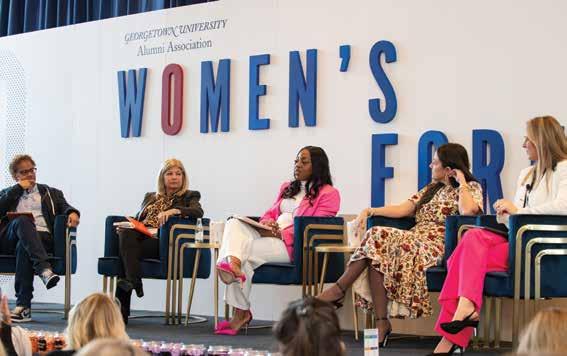
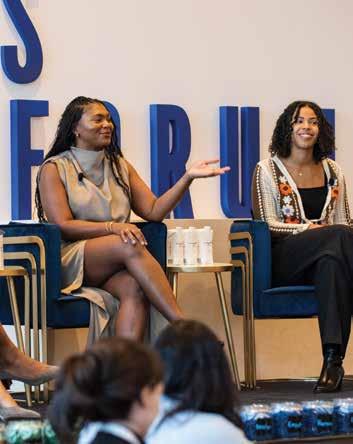
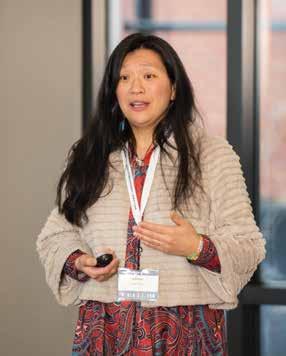
LAW ALUMNAE EXPLORE ENTREPRENEURSHIP, EMPOWERMENT AT
The 2024 Georgetown University Women’s Forum brought together 325 guests on February 23 to celebrate and strengthen the alumnae community. Law Center speakers included documentary filmmaker Dawn Porter, L’93, civil rights lawyer and “Survivor” finalist Katurah Topps, L’15, family caregiving attorney Allison Wyman, L’12 and financial analyst Kimberlee Davis, F’80, L’83. Davis, who attended with daughter Allison Berkowitch, C’13, L’18, said, “That shared experience and love of Georgetown is a very special bond.”
Save the date! The next Georgetown Law Women’s Forum takes place Friday, February 21, 2025.

Georgetown Law was proud to welcome alumnus Marc H. Morial, L’83, as the featured speaker at the 2024 New York Alumni Luncheon, held on January 25. Morial, President and CEO of the National Urban League, the nation’s largest historic civil rights and urban advocacy organization, joined Dean William M. Treanor for a wide-ranging discussion about what it means to be a leader and changemaker. As a Louisiana native and past mayor of New Orleans, Morial calls his diverse network the “Gumbo Coalition” — which is also the name of both his 2020 book and a 2023 HBO documentary about his work. Despite the dreadful weather, some 150 guests filled the room with great spirits!
Mark your calendars for the next NYC luncheon: Thursday, January 30 at the University Club, with speaker Kathryn Ruemmler, L’96, Chief Legal Officer and General Counsel at Goldman Sachs and former White House Counsel during the Obama Administration.
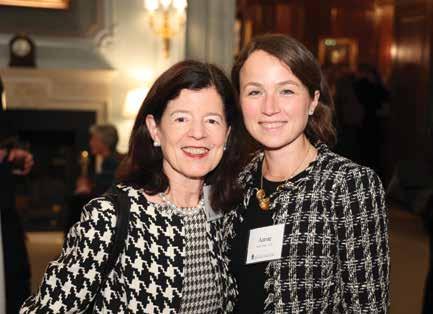
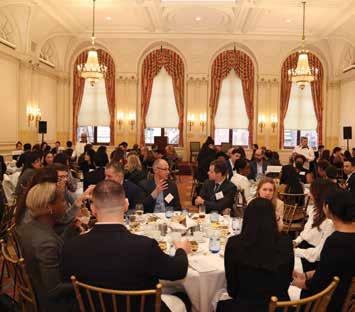
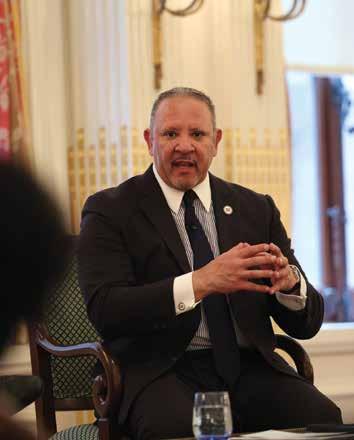
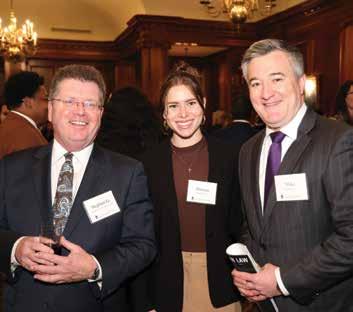
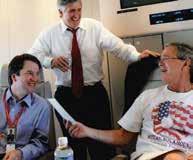
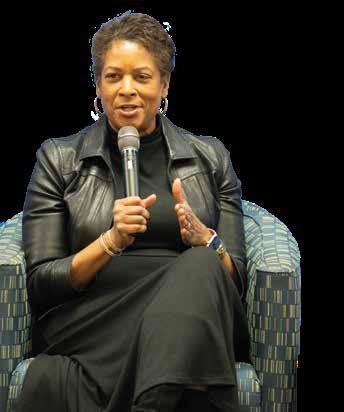
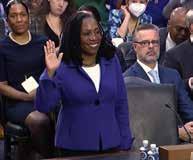
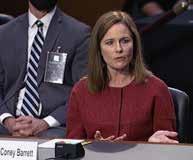
Dawn Porter, L’93, worked at BakerHostetler for five years before moving into TV – first in the Standards and Practices departments at ABC and A&E, then making her way to the creative side. Her work includes the 2023 Showtime series “Deadlocked: How America Shaped the Supreme Court” and the new film “Power of the Dream,” on WNBA players finding their voices as activists. Georgetown Law asked her about her pivot from legal practice to filmmaking.
In Standards and Practices, we would make sure the stories we were reporting were accurate as well as fair. It opened up the process of how you make visual media. I started thinking, “I could do this.” We’ve all had the experience of
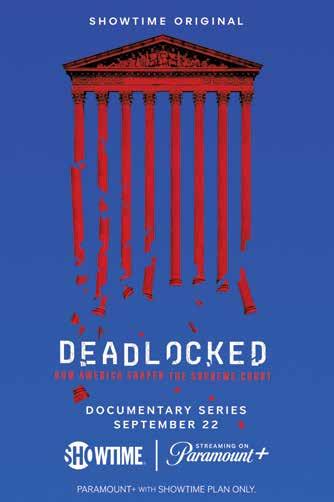
being a little frustrated with how lawyers are portrayed in fiction or documentary, and I thought maybe I could bring some insight. My first film was “Gideon’s Army,” about three young public defenders, and that’s where it all started.
All of the ‘lawyer brain’ is really important. When you think about what film does, you’re communicating something complicated to an audience – and that’s what I did as a litigator. You’re taking a whole set of facts and you’re telling a story with them, and you’re trying to make that compelling. It felt like a really natural progression. The lawyer in you never leaves.
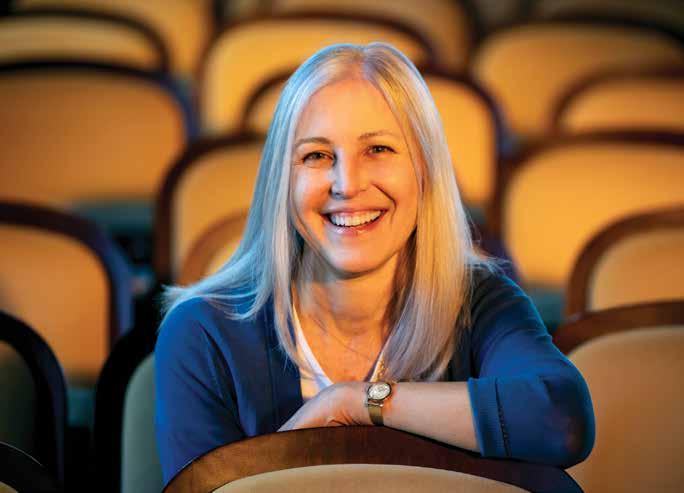
Professor Vicki Girard, L’87, has a block of sticky notes that read “Plans for World Domination” above the space for writing. It’s become her catchphrase for Georgetown’s Health Justice Alliance (HJA), a cross-campus partnership founded in 2016 that trains law, medical and nursing students to use law as a tool to reduce health disparities for marginalized communities.
HJA students learn to help people facing challenges such as food insecurity, poor housing conditions or educational or employment problems that require both legal advocacy and medical care to overcome. “We want lawyers in every hospital and clinic,” says Girard. “When medical students graduate, we want them to know how and when a lawyer should be a part of the healthcare team. That’s the vision.”
Girard first thought she’d be a tax lawyer, but became interested in health and medical law through working with a lawyer who’d been at the Food and Drug Administration. She returned to the Law Center two decades ago to teach Legal Practice, then decided to collaborate with Medical Center counterparts to launch the HJA.
“From the very beginning, you could see the synergy of bringing law and medical students together – how differently they approached issues and learned from each other about ways to think holistically about people,” she says.
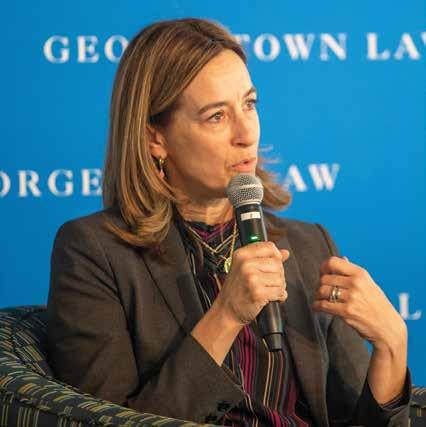
U.S. Representative Mikie Sherrill L’07, (D-N.J.), returned to her alma mater on April 15 to retrace the path that led her from piloting Navy helicopters to serving in Congress. Part of the first class of combat-eligible women pilots, she felt drawn back to public service after attending law school. She served as an Assistant U.S. Attorney for the District of New Jersey, then ran for Congress in 2018, in a district that had long elected Republicans. Campaigning, she focused on issues important across the political spectrum and met as many voters in person as she could. She still believes in her approach, despite the polarization on Capitol Hill. “It’s hard to divide people in this country,” she said. “Bringing people together feels, to me, a more natural way.”
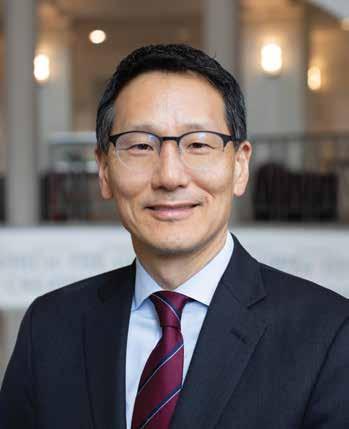
After seven years in leadership at his law school alma mater, Georgetown Law Chief Operating Officer David Mao, L’93, became the 12th Librarian of the Supreme Court of the United States. He is the first Asian American to serve in the role.
Mao, who spent more than a decade at the Library of Congress before returning to Georgetown in 2017, traces his interest in libraries back to his days as a work-study student assigned to the Edward Bennett Williams Law Library.
Having divided the past three decades between jobs in government, the private sector and academia, Mao described his career path as “serpentine.” In his new position, he oversees a collection of more than 600,000 books and electronic resources that serve the research needs of the Supreme Court Justices.
Mao said he was drawn to the opportunity to serve an important institution at what in many ways is a turbulent time. “Making sure our democracy continues after 248 years – that’s what it’s all about,” said Mao, “Civil servants work to make sure that our institutions continue to carry on in the way they’re supposed to.”
For Valentines’ Day this year, we collected stories from couples whose connections began at Georgetown Law. Here are a few — find more in the news archive at law.georgetown.edu!
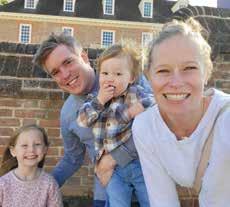
Bryan Kennedy, C’08, L’11, and Noel Miller, L’13, met in mock trial and eventually started dating, despite multiple terrible evidence-related puns sneaking into the relationship. Today, they live in Falls Church, Va. with their two wonderful children. Absent objections, evidence-related puns continue.
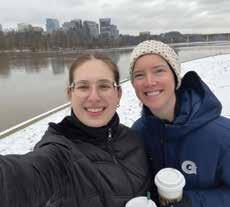
Lauren Eber, L’25, and Emily Phelps, M’24, bonded over their mutual love for Georgetown mascot Jack the Bulldog. Although they hailed from separate campuses, they enjoyed when their affinity groups from the Law and Medical Centers held joint events.
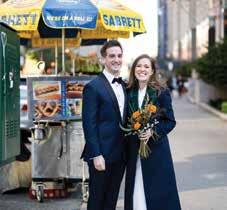
Dillon Rodriguez, L’22, and Sarah Schmidt L’22, were Section 4 classmates and grew closer through walks to the Gallery Place Metro stop after their Civ Pro class. They were married last November at City Hall in New York City.
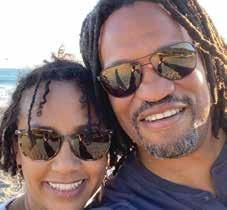
Kenneth Anderson, L’98, L’04, and Tienne Anderson, L’01, had seen each other around campus, but did not actually speak until they ran into each other at a nightclub. Their shared love of community and service has sustained them throughout their careers and their marriage.
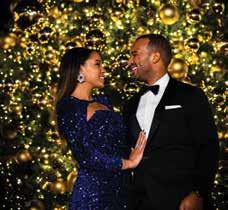
Jarryd Anderson, L‘20, and Katherine Anderson, L’16, met when she crashed his birthday party with a mutual friend. “Our first date was a few days later and after dinner we ended up watching the Democratic presidential debates — a very D.C. thing to do,” she recalled.
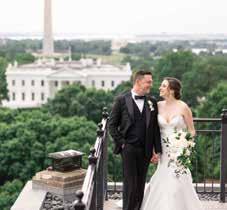
Christian Hatten, L’22, and EB Hatten, L’22, met through the Gilbert and Sullivan Society as 1Ls, just before the COVID-19 pandemic. After a year of virtual school and theater, they finally got the chance to perform together on stage in “Legally Blonde” during their final semester.
1969
Gene Hines has published a book, The Power of Story. Available on Amazon, it seeks to explore the incredible importance of story as an avenue for the evolution of higher consciousness and the peaceful interconnection of humanity.
1970
Ira “Jack” Waddey has launched a new intellectual property boutique law firm, Waddey Acheson, in Nashville. Waddey’s IP expertise began during his student days, when he paid his way through law school by working as a patent examiner at the U.S. Patent and Trademark Office.
1971
Joel P. Bennett retired in 2018 after a 47-year career as a member of the District of Columbia bar. He served as president of the Bar Association of the District of Columbia and chair of the Law Practice Management section of the American Bar Association. He was also the co-founder and first chair of the Law Practice Management section of the District of Columbia bar.
1972
Thomas A. Woodley, retired general counsel of the International Association of Fire Fighters, has authored a book titled Last Alarm, the Charleston 9 (iUniverse). It details the tragic story
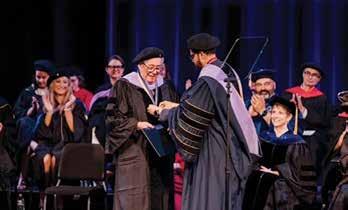
Richard Snyder, L’66 (LL.M.), a partner in the Boston office of Duane Morris LLP, was awarded an honorary Doctorate of Design Leadership by Boston Architectural College, where he has been a trustee since 2008. He has built a broad practice in business law, but the citation for his honorary degree described him as “a designer at heart.”
and legacy of nine brave firefighters who died in the line of duty battling the 2007 Sofa Super Store fire in Charleston, S.C.
Clifford Rieders, partner at the Pennsylvania firm Rieders, Travis, Dohrmann, Mowrey, Humphrey & Waters, visited Georgetown Law in January to speak to the Combating Antisemitism student-led community interest group. In his talk, “Litigators’ Approach to the Intersection of Civil Rights and Religious Liberty,” Rieders shared his firsthand experience litigating civil rights cases involving members of the Jewish community, women and others.
Terence Brennan has joined Henderson, Franklin, Starnes & Holt, P.A. in Fort Myers, Fla. as of counsel in the firm’s Business and Tax department.
Charles J. Sheehan, a retired federal attorney, published an article in the Journal of the Air Force Historical Foundation about his grandfather, Judge Charles Fahy, L’1914. The article includes excerpts from Fahy’s diary of his World War I experiences flying in bombing raids on German U-boat docks in Belgium. Fahy went on to serve as U.S. Solicitor General in the FDR administration during World War II.
The Hon. Leslie A. Hayashi, a district court judge for the First Circuit in Honolulu, Hawaii,
has been elected secretary of the board of trustees of The National Judicial College (NJC), the nation’s oldest, largest and most widely attended school for judges. She is a longtime member of the NJC faculty.
John R. Trentacosta recently retired from the Detroit office of Foley & Lardner, where he established the firm’s Automotive Industry team. Last year, he and a colleague authored Law of the Automotive and Manufacturing Supply Chain: A Handbook for Success, published through their firm. Trentacosta’s forthcoming book – his fourth – is titled The 25 Most Significant Legal Cases in Automotive History
Marc Oberdorff, senior tax counsel with the South Carolina firm Pope Flynn, was elected a Fellow of the American College of Bond Counsel. Oberdorff, whose practice focuses on tax law and public finance, was one of 16 bond attorneys selected for induction in the class.
1981
Cynthia K. Bolden Gardner, F‘78, received a lifetime achievement award at the 2023 African & Caribbean International Leadership Conference & Awards Gala. She is a semi-retired government and private sector attorney and founder of three churches.
Marla Tepper has joined Kalmanson Cohen LLC in New York City as special counsel, working on employment discrimination cases and providing employment and
nonprofit guidance. She previously served as general counsel to two NYC nonprofits and worked at the NYC Dept of Consumer Affairs, as an Assistant U.S. Attorney and New York State Assistant Attorney General.
Douglas Charnas (LL.M.), a partner in the Washington, D.C. office of McGlinchey Stafford, was inducted into Case Western Reserve University School of Law’s 2023 Society of Benchers, the school’s Hall of Fame. Charnas, a corporate and tax attorney, has taught in the Georgetown Law LL.M. Tax Program as an adjunct professor for more than 30 years.
The Hon. Roslynn Mauskopf has joined Bracewell LLP’s New York office as a partner in the Government Enforcement and Investigations practice. Mauskopf has had an extensive career in public service, including as an Assistant District Attorney in Manhattan, New York State Inspector General and United States Attorney for the Eastern District of New York. In 2007, President George W. Bush nominated her to serve as a judge in the Eastern District of New York, then in 2021, she became director of the Administrative Office of the U.S. Courts. She retired from the federal judiciary earlier this year.
Serena M. Williams writes, “I retired as a Professor of Law from Widener University Delaware Law School (DLS) and was honored to be awarded status as Professor Emerita. My career spanned over 35 years at various law schools, teaching property law courses. I also served for 10 years as Assistant Dean of Student Affairs at DLS.”
James Newell was elected CEO of the Pennsylvania firm Buchanan Ingersoll & Rooney. Newell was previously a member of the firm’s board and the chair of its Financial Institutions, Bankruptcy and Real Estate section.
Gary Friedman joined Seyfarth Shaw LLP to help launch a new cross-practice advisory group at the nexus of labor and employment law and complex commercial litigation. Friedman, previously with Weil, Gotshal & Manges LLP, is a partner based in New York.
Kelly Ryan became President of Jesuit Refugee Service/USA on May 1. She has more than three decades of experience in immigration and asylum law and migration policy, including serving as an appointee in the administrations of both President George W. Bush and President Barack Obama.
Shanlon Wu is now a partner in McGlinchey Stafford’s Litigation and Investigations team in Washington, D.C. Wu, a former federal prosecutor, has developed a niche university defense practice representing students, families, institutions and academic personnel in secondary and higher education investigations.
Lynn Neils has joined the firm co-founded in 2022 by fellow Georgetown Law alumna Ilene Jaroslaw, L’88. The firm, now named Elliott Kwok Levine Jaroslaw Neils LLP, is a New York litigation and dispute resolution firm with a China advisory practice. Another Hoya Lawya, Sara Probber, L’18, is an associate at the firm.
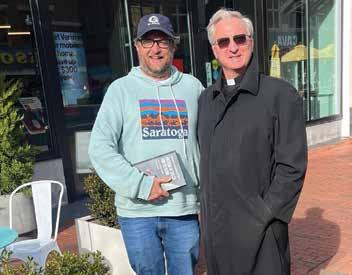
Peter Barcroft, L’92 (LL.M.), a senior program director with an international NGO, and Fr. Franciszek Longchamps de Berier, L’92 (LL.M.), a Catholic priest and professor of law at Jagiellonian University in Kraków, Poland, met up in Cambridge, Mass. in April. Explained Barcroft, “Frank was co-organizing a conference at Harvard Law School and I live in New York State, about 2.5 hours’ drive away, and we saw a chance for a reunion.”
Wayne Pecht (LL.M.) is an equity shareholder and co-chair of the Trusts and Estates group at Saxton & Stump in Lancaster, Pa. He is also a Certified Public Accountant and frequently lectures on wealth preservation, retirement, tax planning and other topics.
Amii Barnard-Bahn joined Kaplan & Walker LLP as a partner based in the firm’s Sacramento office. She also has a professional coaching consultancy and has worked with executives at global companies like Bank of the West, Adobe, AbbVie and The Gap.
Debra McGuire Mercer, C’89, was elected to the partnership at Nelson Mullins. She is in the firm’s Washington, D.C. office and focuses her practice on communications and technology regulation.
Earnie Porta, F’86, G’18, mayor of the Town of Occoquan, Virginia, published his second book in April. Hurricane Agnes in Virginia (The History Press/Arcadia Publishing) details the devastating path of 1972’s Hurricane Agnes through the Commonwealth of Virginia.
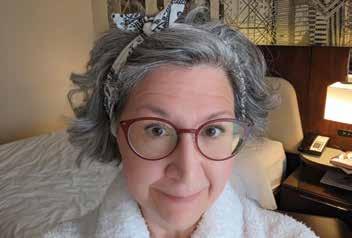
In April, Kara Kinney Cartwright, L’93, spent two weeks in Dayton, Ohio, as a grand prize winner of the “A Hotel Room of One’s Own” Erma Bombeck | Anna Lefler Humorist-in-Residence Program. Cartwright, a legal editor based in Potomac. Md. and recent widow, used the time to work on her forthcoming book, which she describes as a “sneakily supportive and somewhat sweary guide to grief for Gen-X and Millennial women who would sooner cut their own bangs than seek advice for a ‘spiritual journey.’” The prize also included a custom-embroidered robe and participation in the Erma Bombeck Writers’ Workshop at the University of Dayton. “After my husband died in 2021, I thought I was done with humor writing. Eventually, a wise reader gently suggested that I stop torturing everyone with strange, depressing little poems and try writing something people could stand,” said Cartwright after her residency, describing the experience as “a vote of confidence in humor itself, in the importance of making art that entertains, comforts and ultimately unites.”
James M. Sullivan, a corporate restructuring and bankruptcy lawyer, joined Seyfarth Shaw as partner in its corporate department and a member of the newly formed Restructuring and Insolvency practice. Previously a partner at Windels Marx, Sullivan is based in New York City.
Carla Marino became a partner in the Family Law practice at Wisler Pearlstine, LLP in Malvern,
Pa. Marino is also a Pennsylvania founding member of the Amicable Divorce Network.
Brian Pinheiro (LL.M.), was named Managing Partner of Finance and Operations at his firm, Ballard Spahr. Based in Philadelphia, he continues to lead the firm’s Employee Benefits and Executive Compensation group.
Raja Sékaran joined as a Member of the Health Care and Life Sciences practice group at Epstein Becker & Green in San
Francisco. He has more than 25 years of experience at health care organizations, as a health law enforcement attorney and in private practice.
The Hon. Joseph Laroski, F’94 (LL.M.) was appointed by President Joe Biden to the U.S. Court of International Trade in Manhattan. Previously a partner at Schagrin Associates, Laroski also served as Deputy Assistant Secretary for Policy and Negotiations and Director of Policy at the U.S. Department of Commerce, International Trade Administration.
Louis Lopez (LL.M.) joined AARP Foundation as vice president for litigation. His portfolio includes economic justice, labor and employment and consumer protection. Lopez also was appointed Chair of the ABA’s Commission on Hispanic Legal Rights and Responsibilities.
John D. Woodward, Jr., a Professor of the Practice of International Relations at Boston University, was named the director of BU’s Division of Military Education. He participated in Army ROTC himself as an undergraduate at Penn and earned a commission in the Army’s Corps of Engineers. He has also served at the CIA, the Defense Department and the RAND Corporation.
Remo Eyal started a business in Sanford, Fla., Decision Tactical, a facility with simulated shooting ranges and scenario environments where law enforcement officers can train and civilians can learn about being in crisis situations, without the dangers of live ammunition.
Asha Scielzo, director of the Health Law and Policy program at American University Washington College of Law, became president of the American Health Law Association, a nonpartisan educational organization devoted to legal issues in the health care field.
Felicia Watson (LL.M.), formerly assistant vice president of construction liability and research at the National Association of Home Builders, has joined Littler as senior counsel in its Washington, D.C. office. She is in the firm’s Occupational Safety and Health practice and a member of Littler’s Workplace Policy Institute, the firm’s government relations and policy arm.
LaTonya Reynolds, MBA’01, has joined the Baltimore office of Semmes, Bowen & Semmes as counsel in their Labor & Employment practice group. Previously, Reynolds was a senior employment law attorney for a financial services company.
Joseph Leventhal has joined Glaser Weil as partner and head of litigation for the San Diego Office. A trial attorney with experience in complex commercial litigation, class actions and real estate, employment and IP disputes, he also serves on the Southern District of California’s Standing Committee on Discipline, on the national board of directors of the Federal Bar Association and as vice president of the San Diego Federal Bar Foundation.
Jerri Green was elected to theMemphis City Council, giving the council a female majority for the first time in the city’s 200+-year history. In addition to her elected role, she continues to work as Senior Policy Advisor to Mayor Lee Harris.
Aaron Clemens, an attorney at Romano Law Group, a personal injury firm in West Palm Beach, Fla., was appointed to the Board of the Palm Beach County Justice Association. He is also a past
president of the Georgetown Club of Palm Beach and of the Palm Beach County Association of Criminal Defense Lawyers.
J. John Kim, a partner at Pashman Stein in New Jersey, is now juggling his private practice with his new duties as a U.S. Army Judge Advocate General (JAG) officer, providing legal services to New Jersey Army National Guard members preparing for deployment. Becoming a JAG officer is a long-held dream and a return to military service for Kim, who paid for his college education through Boston University’s Army ROTC program.
Melissa Messina has rejoined the Baltimore office of Miles & Stockbridge as a principal. A public finance and real estate lawyer focused on senior living and life-plan communities, Messina first worked for the firm as a summer associate and spent more than a dozen years there before taking other positions in investment banking and private practice.
Warren Allen has joined the Washington, D.C. office of Miles & Stockbridge after co-founding a boutique white-collar litigation firm where he represented companies and individuals in government enforcement proceedings, litigation and corporate compliance matters. Before enrolling at Georgetown Law, Allen spent six years as a police officer and detective in Los Angeles.
Ted Mayle was elected partner in Kilpatrick’s 2024 Partner Class. Based in Denver, he is a patent litigation attorney focused on intellectual property litigation in federal district courts and the Federal Circuit and patent prosecution before the U.S. Patent and Trademark Office.
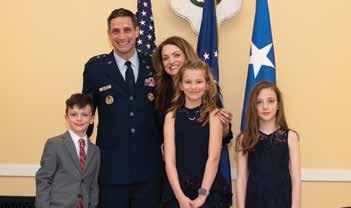
Sarah McGinley, L’09, shared updates on herself and her classmate and husband, Michael McGinley, L’09. Michael, a member of the Air Force Reserve, was recently promoted to Brigadier General in the United States Air Force. In addition to serving as the Mobilization Assistant to the Commander of the Air Force Life Cycle Management Center at Wright-Patterson Air Force Base in Ohio, he is a federal account executive at Google. Sarah practices real estate law outside of Boston and is the elected vice chair of the Bedford, Mass. School Committee. Together, they are raising children Elle, Claire and Finnian.
Kimberly J. Duplechain, a member of the eDiscovery Group at Littler in Washington, D.C., was appointed co-chair of the firm’s Bollo affinity group. Bollo provides support and networking opportunities for attorneys who identify as Black, African American, African and Caribbean and their allies. The group’s name, meaning “to be together,” comes from the Wolof tribe of Senegal.
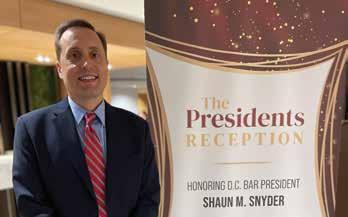
Shaun Snyder, L’03, CEO of the National Association of State Treasurers, was sworn in as the 53rd president of the D.C. Bar on June 20. In his speech, Snyder said that one of the focus areas of his presidency will be preparing the way for the future of the legal profession, such as through programming and thought leadership to educate members about artificial intelligence and its impact on law.
Roy D. Prather III, a principal at Beveridge & Diamond PC in Baltimore, Md., has joined the International Association of Defense Counsel, an invitation-only organization for attorneys who represent corporate and insurance interests. He focuses his practice on complex environmental and commercial litigation matters and counseling on environmental justice.
Thomas Cluderay was named general counsel of The National Wildlife Federation. He has been deputy general counsel of the Federation since 2022 and previously served as associate general counsel or general counsel at other organizations, including the
Aspen Institute and the Environmental Working Group.
Rollo C. Baker, IV launched Elsberg Baker & Maruri PLLC, a trial, litigation and arbitration firm based in New York. His co-founding partners include former colleagues from his previous firm, Quinn Emanuel Urquhart & Sullivan, where he was co-chair of the Corporate Governance Litigation practice. 2011
Alex Berg was promoted to shareholder at Littler. Based in the firm’s Tysons Corner, Va. office, he represents and counsels employers facing a wide variety of labor and employment law issues. Berg is a board member of and contributor to Bender’s Labor and Employment Bulletin and other publications about topical labor and employment issues.
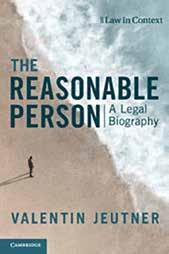
Kendra Perkins Norwood has joined Reed Smith LLP as a partner in the firm’s Global Regulatory & Investigations practice group. She represents companies that do business with federal and state governments in a wide range of litigation, regulatory compliance and transactional matters.
Monica Carmean is now a Presidential Management Fellow in the federal Office of Personnel Management, based out of Chicago with periodic travel to Washington, D.C.
James Hunsberger was promoted to partner at Axinn, Veltrop & Harkrider. He works out of Washington, D.C. on the full range of antitrust matters, including high-profile mergers, litigation and government investigations.
Christopher J. Dufek was promoted to partner at Hunton Andrews Kurth. A litigator in the Washington, D.C. office, he focuses his practice on complex commercial and class action litigation.
Valentin Jeutner, L’12 (LL.M.), Associate Professor of Law at Lund University in Sweden and Senior Retained Lecturer at Pembroke College of Oxford University, has published a new book, The Reasonable Person: A Legal Biography (Cambridge University Press).
Billed as “the first biography of law’s most famous and most controversial character,” the book traces the standard of the reasonable person across time, legal fields and countries, from ancient Egypt to self-driving cars.
Matthew Boaz joined the faculty at the University of Kentucky Rosenberg College of Law this fall as an assistant professor teaching immigration law. He spent the past five years directing the Immigrant Rights Clinic at Washington & Lee University School of Law in Virginia.
J. Daniel Boysen (LL.M.) has been promoted to shareholder at Dallas firm Wallet & Perrin. He represents clients in joint ventures, mergers and acquisitions, dispositions, private securities offerings, financing and restructurings.
Lauren Goldman of New York City has been elevated to partner at Boies Schiller Flexner LLP. Her practice spans a variety of industries, such as media and sports, real estate, finance and insurance. Goldman’s pro bono work includes securing the support of women athletes and sports organizations for petitions arguing to uphold reproductive rights.
Andrew Nerney (LL.M.) is now a Trust & Estates Of Counsel at Blank Rome LLP in New York City. He joined the firm’s Tax,
Benefits and Private Clients practice group.
Darshan Chulani has joined Caplin & Drysdale as an associate in the Private Client group, based in the Washington, D.C. office. He provides tax and estate planning advice to high-net-worth individuals.
Waleska Suero Garcia has joined Yankwitt LLP in White Plains, NY. At her previous firm, Boies Schiller Flexner, she built a broad practice, representing individuals and entities in all stages of litigation in civil and criminal matters.
Gina Falaschi Buchman, C’13, was named a shareholder in Pittsburgh’s Babst Calland. Buchman focuses her practice on environmental regulatory matters arising under the Clean Air Act, advising clients on compliance with state and federal environmental regulations.
Nicholas J. Diamond, C’08 (LL.M.), joined the Houston office of Greenberg Traurig, LLP as a shareholder, where he is part of the firm’s Health Care and FDA practice. Diamond is also an adjunct professor at Georgetown Law and at the University of Houston Law Center. At Georgetown, he will teach a seminar this spring on Bioethics and Social Justice.
After several years in house at Novartis, Erin M Foley joined the firm Foley Hoag LLP as Counsel in the Intellectual Property department and as a member of the Patent Prosecution, Strategy & Management and PTAB Proceedings practices.
Alan Gocha was promoted to member at Bodman PLC. He is based in Bodman’s Grand Rapids, Mich. office and is a member of the Litigation and Alternative Dispute Resolution, Appellate Law and Intellectual Property practice
groups. He also earned a place on the 2024 State Bar of Michigan’s A Lawyer Helps Pro Bono Honor Roll for completing over 100 hours of service.
Sam Royko joined Dykema as a senior counsel in its Business Litigation practice group, resident in the firm’s Chicago office. Royko joins Dykema after serving as founder and managing partner of The Royko Group, LLC and partner at L&G Law Group, LLP.
Classmates Joe Altieri and David Schifrin have both been promoted to partner at Hollingsworth LLP in Washington, D.C. Altieri focuses on representing large corporations in complex products liability litigation. He is also a member of the District of Columbia LGBTQ+ Bar Association. Schifrin is a litigator with the firm’s Complex Litigation, Pharmaceutical Products and Toxic Torts & Products Liability group and a member of the American Bar Association.
Joseph A. Caruso, III (LL.M.) was recently promoted to assistant vice president and head of public policy for Jackson Financial. He is also vice chair of the Insured Retirement Institute’s (IRI) securities committee and is a member of the Exchequer Club of Washington, D.C.
Andrea G. Woods (LL.M.) joined Gilbane Building Company as senior legal counsel for its Midwest Division. She also serves on the Judicial Ethics Advisory Board for the Center for State Courts in Arlington, Va.
Bass Chadwick has joined the Blue Bell, Pa. office of Fox Rothschild as an associate in the Taxation & Wealth Planning department.

Sokunthyda Long, L’23 (LL.M.) shared an update with the Georgetown Legal English Blog about her work with the firm Edenbridge Asia on repatriating looted Cambodian artifacts. The Edenbridge team and its partners have been successful in helping return hundreds of artifacts to Cambodia, including 14 artifacts recently returned from the Metropolitan Museum of Art. Long, a Cambodian citizen who completed Georgetown’s Two-Year LL.M. Program with a focus in International Business and Economic Law as a Fulbright Foreign Student, said that her studies at the Law Center greatly enhanced her skills in legal writing and diplomacy, which she is putting to good use in her ongoing repatriation work. “It’s still a bit unbelievable to me that we got the Met to return the artifacts. But I’m extremely proud to have been able to contribute to the effort,” she wrote.
Three recent graduates, Sierra Campbell, Ella Helmuth and Jessica Wang, were named to Equal Justice Works’ 2024 Fellowship class. Campbell is in Washington, D.C., promoting safe housing for low-income tenants with the Children’s Law
Center’s Healthy Together medical-legal partnership. Helmuth is advocating for clean water access at the Appalachian Citizens’ Law Center in Whitesburg, Ky. Wang is with the MacArthur Justice Center in Chicago, focusing on enforcement of Illinois’ new Pretrial Fairness Act, which aims to reduce pretrial detention and electronic monitoring.
THE HON. RICARDO M. URBINA, C’67, L’70, a trailblazing judge, died in June at the age of 78. The first Latino to serve on the D.C. Superior Court and the U.S. District Court for the District of Columbia, Urbina is remembered by colleagues for his commitment to civil liberties and his compassion — a 2011 Washington Post profile highlighted his careful consideration and creativity in sentencing decisions. D.C. Superior Court Chief Judge Anita Josey-Herring, L’87, described him as a “deliberate and passionate jurist” whose “humility as a civil rights icon was inspiring.”
THOMAS LYDON, C’67, L’90, a Vietnam veteran who became a public defender after a distinguished career as a reporter and columnist, died in January at the age of 78. While his professional achievements were notable, friends also recall his dedication as a caregiver to his wife, Jane, after she was disabled by a stroke, and his gentle presence on the Georgetown Law campus, where he frequently attended Mass in the chapel or found a quiet spot to prepare for an upcoming court appearance. “Tom embodied the best of our school’s Jesuit values, especially ‘service to others,’ which he pursued tirelessly,” said Jewish Chaplain Michael Goldman, L’69.
CALEB GRAVES, L’17, a litigation associate at Wilson Sonsini Goodrich & Rosati, died in September at the age of 35. In addition to his promising legal career, Graves dedicated time to creative outlets: he documented his travels, especially at Disney theme parks, for thousands of followers on social media, and had recently published a volume of poetry, love, and other love. Classmate and friend Vadim Egoul, L’17, said, “Across all aspects of his multifaceted life, Caleb was honest, passionate and fearless. He was constantly evolving and had so much more greatness to achieve.”
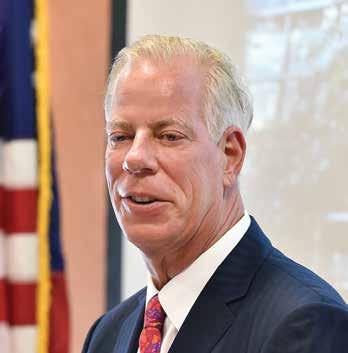
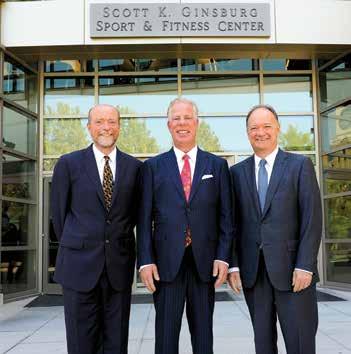
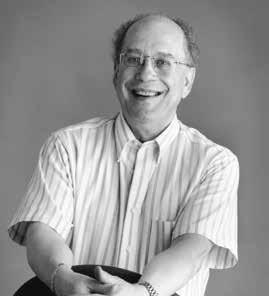
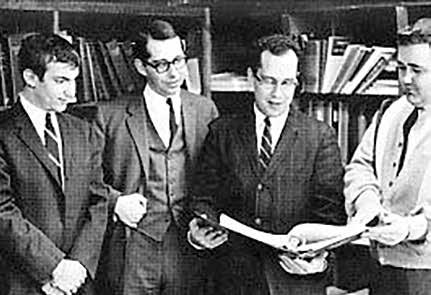
Businessman and philanthropist Scott K. Ginsburg, L’78, died in May at the age of 71. After several years working on Capitol Hill, he co-founded and served as CEO of Chancellor Media Corporation, a leader in radio broadcasting, then founded Boardwalk Auto Group, a luxury car sales company with multiple locations in California and Texas. He was one of Georgetown Law’s most generous supporters. His gifts over the years transformed both the campus and the faculty: the Scott K. Ginsburg Sport & Fitness Center is a vital hub for the Law Center community, and 13 faculty members now hold Scott K. Ginsburg Professorships. “I know the professorships are a legacy Scott was proud to leave behind,” said Dean William Treanor. “I always enjoyed his terrific sense of humor and his kindness.”
Professor Emeritus Sherman L. Cohn, F’54, L’57, L’60, the longest-serving member of the Georgetown faculty and a “triple Hoya” with three Georgetown University degrees, died on August 5. Known as “Sherm” to friends and colleagues, Cohn joined the Georgetown Law faculty in 1965. In addition to becoming a mainstay of the 1L curriculum team as a professor of Civil Procedure, he taught seminars in a variety of areas of law he found of interest, such as the American legal profession, Jewish law and alternative and complementary medicine. He founded the Law Center’s Continuing Legal Education program and its Appellate Litigation Clinic, and was a longtime leader of the Law Annual Fund. “It was easy to love him, because he was so obviously full of the enjoyment of life,” recalled Judge Kent Jordan, L’84, who as a student worked with Cohn on one of his pet projects: launching the American Inns of Court.
• Patricia Bauman, L’82
• James P. Beirne, L’73
• Michael William Broderick, L’96
• George G. Burke, L’59
• The Hon. John O. Colvin, L’71, L’78
• Edward G. Conroy, L’67
• Thomas Cooke, L’74, L’76, L’85
• Max H. Crohn Jr., L’61
• Richard Owen Davis, L’92
• Richard K. DeScherer, L’69
• Donald R. Dinan, L’74
• G. Richard Dodge Jr., L’98
• Melvin Lander Doxie, L’88
• Thomas A. Farr, L’82
• Bruce S. Feldacker, L’69
• Spyro J. Gellos, L’54
• Barry R. Goldsmith, L’75
• John F. Hayward, L’65
• Richard A. Hibey, L’65, L’66
• Dale Curtis Hogue, L’72
• Maura Blue Jeffords, L’02
• Anthony Hochin Kahng, L’99
• James A. Keenan Jr., L’57
• Robert S. Klein, L’74
• Mark Andrew Komisky, L’92
• Victor Ho Lee, B’82, L’85
• Lawrence E. Logue, L’61, L’66
• Timothy B. McBride, L’75, L’80
• E. Frank McKinney, L’61
• Edward McManimon III, C’68, L’71
• Eric C. Mittereder, F’08, L’11, L’12
• Richard J. Phelan, L’61
• Robert L. Picher, L’54
• Jeffrey E. Poindexter, L’94
• Thomas J. Purdom, L’66
• Jack Quinn, C’71, L’75
• Edward M. Ricci, L’73
• Amber C. Robinson, L’13
• Edward D. Ross Jr., L’70
• The Hon. Michael J. Skwierawski, L67
• Paul M. Thompson, L’59
• The Hon. Patricia V. Trumbull, L’73
• Thomas Stephen Vaughn, B’77, L’80
• Richard L. Warrick, L’74
• Fred M. Zeder III, L’72
We’ll be in town the week of January 6 for events with local alumni and with those in town for the Association of American Law Schools’ Annual Meeting. Be on the lookout for more details.
Join us at the University Club on Thursday, January 30 for the annual NYC Alumni Luncheon, featuring remarks from Kathryn Ruemmler, L’96, Chief Legal Officer and General Counsel at Goldman Sachs.
The biennial Georgetown Law Women’s Forum, held next on Friday, February 21, celebrates our alumnae community with dynamic speakers, stimulating breakout panels, an Awards Luncheon and wonderful networking opportunities.
On Wednesday, June 18, we’re hosting a special opportunity to become a member of the Bar of the U.S. Supreme Court alongside fellow alumni. The swearing-in ceremony will be followed by a reception. Find the Form of Intent and complete information on eligibility, fees and deadlines on the events section of the Georgetown Law Alumni website. All application materials must be received by March 21.

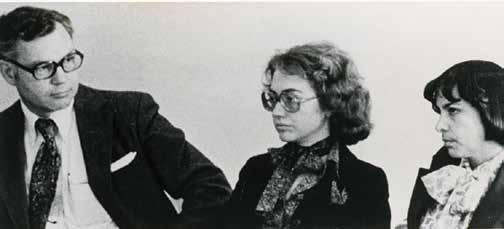
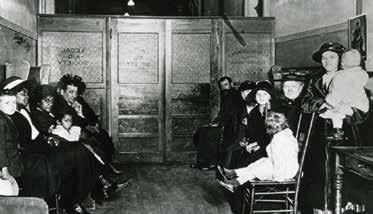
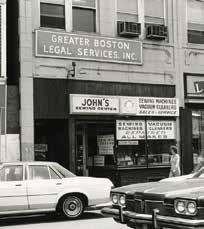
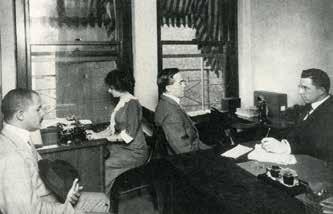
Launched by the American Bar Association, the National Legal Aid and Defender Association and the American Association of Law Libraries in 1988, the National Equal Justice Library (NEJL) seeks to preserve the vital history of America’s efforts to provide legal counsel to those least able to afford it. Consisting of more than one thousand boxes of legal materials occupying 740 linear feet, the NEJL found a permanent home at the Georgetown University Law Library in 2006. In addition to vintage photos of early efforts at legal assistance and of leaders in the legal aid movement, the collection consists of the records of various legal aid societies, such as the Legal Services Corporation (LSC), the National Legal Aid and Defender Association, state legal aid organizations and some international organizations. The NEJL also includes a book collection of limited print books on various legal aid topics, an oral history collection consisting of 79 interviews and two linear feet worth of photographs.
Georgetown University Law Center
600
